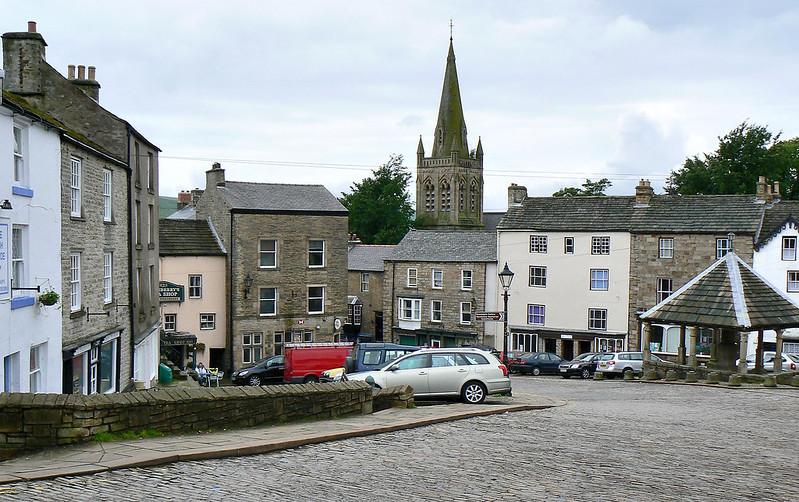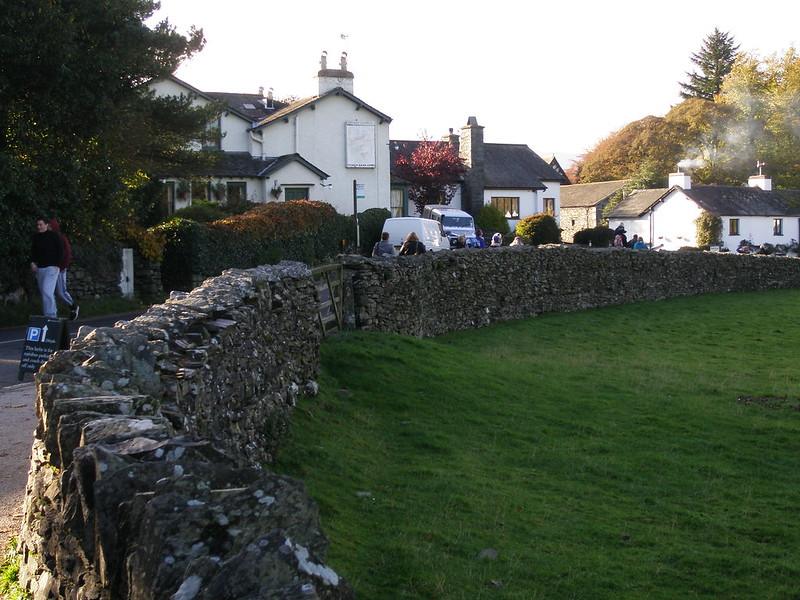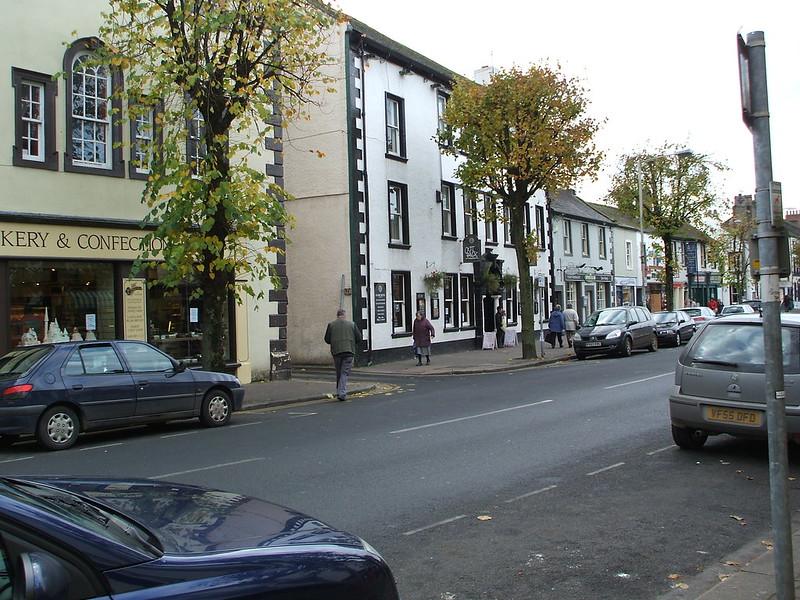Page Updated: 05/07/2025
Introduction to Exploring Alston
Alston, perched high in the North Pennines of Cumbria, is England’s highest market town and a hidden gem for lovers of history, nature, and rural charm. With its cobbled streets, heritage railways, and wild upland scenery, Alston offers a unique blend of ancient traditions and vibrant community life. This guide explores Alston’s fascinating past, must-see attractions, outdoor adventures, and practical travel tips to help you make the most of your visit.
Key Takeaways About Alston
- England’s Highest Market Town: Alston sits over 1,000 feet above sea level in the North Pennines, offering dramatic landscapes and a unique upland character.
- Rich Heritage: The town’s history stretches from Norse origins and Roman forts (Epiacum) to centuries of lead and silver mining, with well-preserved architecture and a vibrant local museum.
- Outdoor Adventure Hub: Alston is a gateway to iconic walking and cycling routes, including the Pennine Way, Isaac’s Tea Trail, and the Coast to Coast cycle route. The area is ideal for hiking, biking, fishing, birdwatching, and stargazing.
- Heritage Attractions: Ride the South Tynedale Railway (England’s highest narrow-gauge line), explore Nenthead Mines, visit Ashgill Force waterfall, and discover the Alston Moor Heritage Centre.
- Welcoming Community: The town is known for its friendly locals, independent shops, monthly producers’ markets, and a strong sense of community spirit centered around Market Square.
- Diverse Accommodation: Choose from cosy B&Bs, historic inns, self-catering cottages, and rural guest houses, many are walker and dog-friendly.
- Local Food & Drink: Enjoy hearty Cumbrian fare in traditional pubs, cafes, and restaurants, with local specialties like lamb, Cumberland sausage, and artisan cheeses.
- Wildlife & Nature: The surrounding fells and woodlands are home to rare birds (curlew, black grouse), red squirrels, deer, and a wealth of wildflowers.
- Stargazing Destination: Minimal light pollution and the new Alston Moor Observatory make the area one of the UK’s best for observing the night sky.
- Year-Round Appeal: Each season brings its own charm, lush spring wildflowers, summer festivals, autumn colours, and snowy winter landscapes perfect for sledging and skiing at Yad Moss.
- Accessible Yet Remote: Alston is reached via scenic upland roads (A686, A689, B6277) and is best explored by car, though public transport and local taxis are available.
- Sustainable & Responsible Tourism: Visitors are encouraged to respect the environment, support local businesses, and follow the Countryside Code to help preserve Alston’s unique character for future generations.
Quick Facts: Alston at a Glance
- Elevation: ~1,000 feet (305 m) above sea level
- Population: 1,075 (2021)
- County: Cumbria
- Historic Economy: Lead, zinc, iron, copper, coal mining
- Modern Economy: Tourism, crafts, small businesses
- Key Attractions: South Tynedale Railway, Ashgill Force, Market Square
- Outdoor Activities: Hiking, cycling, fishing, birdwatching, stargazing
- Notable Trails: Pennine Way, Isaac’s Tea Trail, Heritage Trail
- Accessibility: A686, A689, B6277; nearest rail: Penrith (20 miles)
- Nearby Villages: Garrigill, Nenthead
Discovering Alston’s Rich Historical Legacy
Alston’s story stretches back to Norse times, with its name likely derived from “Halfdan’s by”, a nod to its Viking origins. Once part of the Liberty of Tynedale, the town’s unique status as a borderland settlement shaped its independent character. In the 18th and 19th centuries, Alston was a powerhouse of lead, zinc, and silver mining, with mineral rights passing from the Radcliffe family to Greenwich Hospital after the 1715 Jacobite rising.
Remnants of this industrious past are visible in the town’s architecture and landscape. The Alston Moor Heritage Centre brings this history to life, showcasing the mining industry’s impact and the daily lives of those who shaped the region. The town’s cobbled streets, stone cottages, and historic market cross evoke centuries of local craftsmanship and community spirit.
Alston’s cultural tapestry is woven with folklore, local legends, and literary connections, most notably, poet W. H. Auden, who found inspiration in the wild Pennine landscape. The annual Alston Art and Craft Festival and seasonal fairs celebrate the area’s creative talents and enduring traditions.
Must-Visit Attractions in Alston
South Tynedale Railway: England’s Highest Narrow-Gauge Heritage Line
The South Tynedale Railway is a celebrated heritage railway running through the heart of the North Pennines Area of Outstanding Natural Beauty. As England’s highest narrow-gauge railway, the line reaches over 1,000 feet (305 metres) above sea level and offers a nostalgic journey through spectacular countryside on lovingly restored steam and diesel trains.
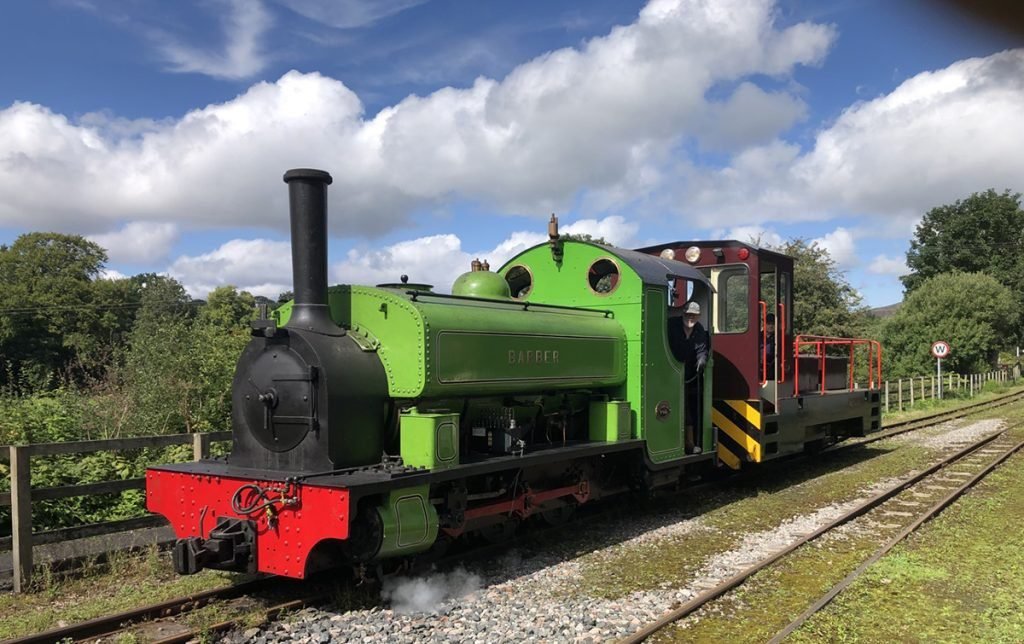
Route and Experience
- Route: The railway operates between Alston (Cumbria) and Slaggyford (Northumberland), covering approximately 5 miles (8 km) of track. The journey follows the scenic South Tyne Valley, crossing three historic viaducts and offering panoramic views of moorland, rivers, and woodlands.
- Stations: Main stations include Alston, Lintley Halt, and Slaggyford. Alston station is the highest standard-gauge station in England, and the line’s northern terminus at Slaggyford was reopened in 2018 after decades of restoration.
- Rolling Stock: Passengers ride in restored heritage carriages pulled by a fleet of steam and vintage diesel locomotives, all maintained and operated by a dedicated volunteer team.
- Accessibility: The railway is family-friendly and accessible, with facilities for wheelchair users and accessible carriages available.
Highlights
- Spectacular Scenery: Enjoy some of the most beautiful views in northern England, including river crossings, wildflower meadows, and glimpses of local wildlife such as red squirrels and curlews.
- Historic Viaducts: The line crosses the impressive Gilderdale, Lambley, and Whitley Viaducts, each offering unique vantage points over the valley.
- Heritage and Education: Discover the legacy of the former Alston Branch Line (closed in 1976) and explore a small museum at Alston station with exhibits on local railway and mining history.
- Special Events: Throughout the year, the railway hosts themed events such as Santa Specials, Halloween trains, and vintage vehicle rallies, making it a lively community hub.
Practical Information
- Length: 5 miles (8 km)
- Gauge: 2 ft (610 mm) narrow gauge
- Season: Trains run from spring to autumn, with special winter events
- Facilities: Café, gift shop, museum, accessible toilets, free parking
- Tickets: Available at Alston and Slaggyford stations or online
- Website: south-tynedale-railway.org.uk
Visitor Tips
- Journey Time: A return trip takes about 1 hour, with time to explore stations and enjoy refreshments.
- Dogs: Well-behaved dogs are welcome on trains (a small fee may apply).
- Group Bookings: The railway caters for group visits, school trips, and private charters.
- Volunteering: The line is run largely by volunteers, and new helpers are always welcome.
The South Tynedale Railway offers a unique blend of nostalgia, engineering heritage, and natural beauty. It’s a must-visit for railway enthusiasts, families, and anyone seeking a memorable way to experience the wild landscapes of the North Pennines.
Alston Moor Heritage Centre
Alston Moor Heritage Centre is a vibrant local museum and archive located in Alston Town Hall, at the heart of England’s highest market town. Operated by the Alston Moor Historical Society, the centre is dedicated to preserving and sharing the rich history of Alston Moor and the North Pennines, with a special focus on mining, rural life, and the area’s unique industrial heritage.
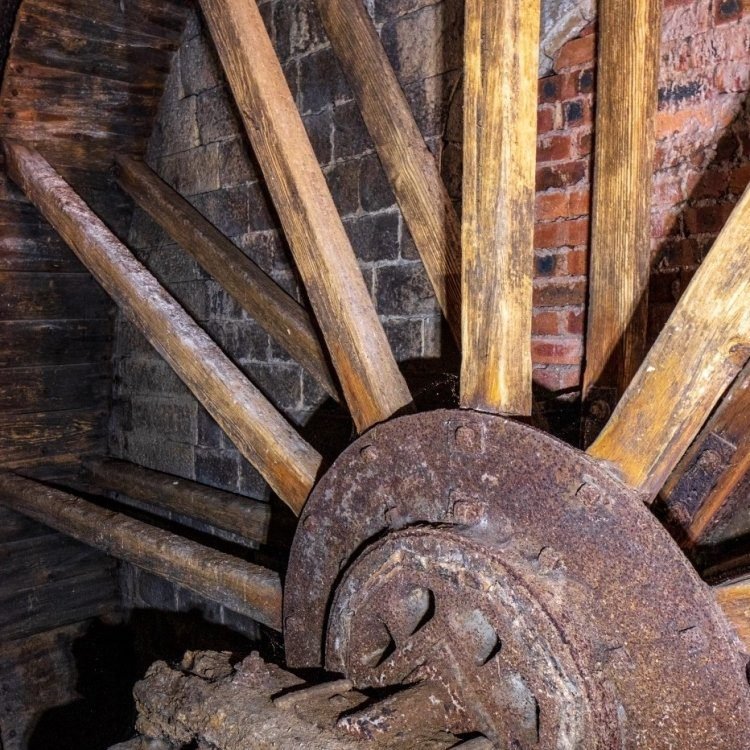
What You’ll Discover
- Mining Heritage: Explore the story of Alston Moor’s lead, zinc, and silver mining industries, which shaped the region’s economy and landscape for centuries. Exhibits include mining tools, mineral specimens, photographs, and documents from local mines and companies.
- Rural Life: Discover artefacts and stories from everyday life in Alston Moor, including domestic items, agricultural tools, and memorabilia from local schools, hospitals, and businesses.
- Local Industry: Learn about the area’s world-leading metal casting industry, the history of John Smeaton (the world’s first civil engineer), and the evolution of local transport, including the South Tynedale Railway.
- Community Archives: The centre houses extensive archives, old maps, photographs, and a rolling slide show, as well as temporary displays on themes such as local agriculture, wartime Alston, and the history of St. Augustine’s Church.
- Special Collections: See unique items like school records from Samuel King’s School, memorabilia from Ruth Lancaster James Cottage Hospital, and personal stories of local figures.
Events & Activities
- Regular talks, guided walks, and special exhibitions throughout the year, often in partnership with other local heritage sites such as Epiacum Roman Fort and Nenthead Mines.
- Genealogical research support for those tracing family roots in the area.
Visiting Information
- Location: Alston Town Hall, Alston, Cumbria
- Opening Times: Usually open every Saturday from 12 noon to 3 pm, or by appointment. Special exhibitions and events may have extended hours; check the Historical Society’s website or local listings for details.
- Admission: Entry is usually free, with donations welcome to support the society’s work.
- Accessibility: The centre is accessible and welcomes visitors of all ages, including families and researchers.
Why Visit?
- Authentic Local History: Hands-on, community-driven insight into Alston Moor’s unique past, from prehistoric times through the industrial era to the present day.
- Interactive & Educational: A mix of artefacts, archives, and interactive displays make the Heritage Centre ideal for history enthusiasts, families, and anyone interested in rural and industrial England.
- Community Resource: The centre serves as a focal point for local heritage, supporting research, education, and cultural events in the region.
For the latest information on exhibitions, events, and opening times, visit the Alston Moor Historical Society website or contact Alston Town Hall.
St. Augustine’s Church, Alston
St. Augustine’s Church is Alston’s most prominent landmark, its tall spire rising above the cobbled main street and visible from across the town and surrounding fells. This Grade II listed church stands at the heart of Alston, occupying a historic, roughly circular site with medieval origins and serving as a centre of worship and community life for centuries.

Historical Background
The current church was built in 1870, with its distinctive steeple completed in 1886, replacing earlier structures that date back to at least 1145 AD. The site’s long history is reflected in its unique dedication to the Holy Paraclete, a dedication not found elsewhere in England. The Victorian design, more typical of an urban church, stands out in this rural setting and replaced an 18th-century church designed by John Smeaton.
Architectural Features
- Exterior: The church’s spire is its most striking feature, complemented by Grade II listed front walls and entrance gates. The churchyard is a tranquil green space with mature trees, offering a peaceful retreat in the centre of Alston.
- Setting: The churchyard provides a rare open space in Alston’s conservation area, valued by both locals and visitors for quiet reflection and community gatherings.
Interior Highlights
- Stained Glass: The church is renowned for its beautiful stained glass windows, which fill the interior with colour and commemorate local families and events. The main window is especially admired for its artistry and vibrant hues.
- Historic Clock and Carillon: Inside, you’ll find a unique clock that once belonged to the Earl of Derwentwater (dated 1767) and a fine carillon, both rare features in a rural parish church.
- Memorials and Graves: Numerous memorials and graves within the church and churchyard reflect Alston’s long and varied history.
Community and Conservation
St. Augustine’s remains a centre for worship, local events, and heritage in Alston. Its prominent position beside the main street and open churchyard make it a key part of the town’s identity. The church and its grounds are part of Alston’s designated Conservation Area, currently listed as ‘at risk’ by Historic England, highlighting the importance of ongoing preservation efforts.
Visiting Information
- Location: Centrally located in Alston, easily accessible from the Market Cross and main street.
- Atmosphere: The churchyard offers a tranquil setting for quiet reflection, while the interior is open to visitors interested in history, architecture, and stained glass.
- Events: The church is often included in local heritage trails and is a popular stop for those exploring Alston and the North Pennines.
St. Augustine’s Church is a striking Victorian landmark with deep medieval roots, admired for its stained glass, historic features, and peaceful setting in the heart of Alston. It is both a spiritual centre and a testament to the town’s rich heritage.
Market Square, Alston: The Heart of Community Life
Market Square is the historic and social centre of Alston, Cumbria, one of England’s highest market towns. Framed by 17th- and 18th-century stone buildings, the square is renowned for its cobbled charm, the iconic Market Cross, and its role as a gathering place for locals and visitors alike.
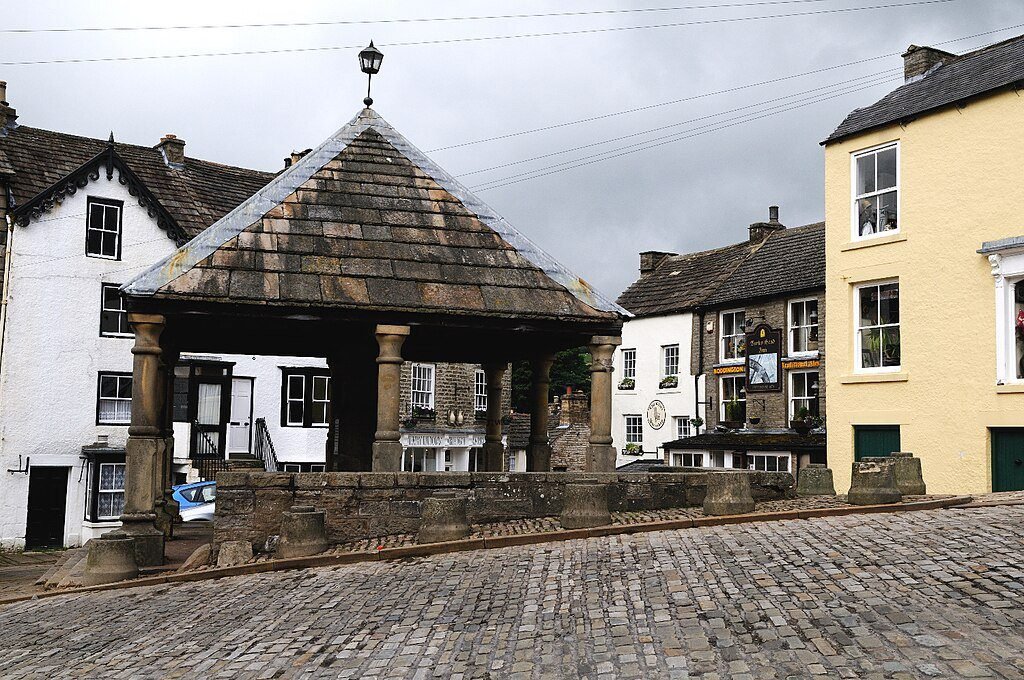
History and Setting
The Market Square has been the focal point of Alston’s community life for centuries. Most of the surrounding buildings date from the late 1600s and early 1700s, and the area is protected as a Conservation Area to preserve its unique character and heritage. The square’s centrepiece, the Market Cross, was originally erected in 1764 and has been rebuilt several times, most recently in 1981. Its stone columns, pyramidal roof, and commemorative inscriptions reflect the town’s long-standing market tradition and civic pride.
Market Day and Local Produce
While Alston no longer holds a weekly outdoor market, it retains the legal right to do so and continues to celebrate its market heritage. Today, a monthly producers’ market is held from April to September, typically in the town hall or adjacent spaces. These markets bring together local farmers, bakers, crafters, and artisans from Cumbria, Northumberland, and County Durham, offering:
- Fresh seasonal produce, meats, and cheeses
- Homemade breads, cakes, and preserves
- Handcrafted goods, art, and gifts
- Local honey, jams, and speciality foods
Market days are lively occasions, drawing residents and visitors to browse stalls, sample regional delicacies, and enjoy the friendly, communal atmosphere. The square is also surrounded by independent shops, cafés, and galleries, making it a vibrant hub for shopping and socialising year-round.
Community Events and Traditions
Beyond market days, Market Square hosts seasonal fairs, craft markets, and community celebrations, including the Alston Gala and Winter Craft Market. These events showcase local music, food, and traditions, reinforcing the square’s role as the beating heart of Alston’s community life.
Architectural and Cultural Significance
The square’s historic buildings, cobbled streets, and the Market Cross are not only picturesque but also tell the story of Alston’s evolution as a market town. Conservation efforts have helped preserve the unique character of the area, with many properties restored through heritage grants and community initiatives.
Visiting Tips
- Check local listings or the tourist information centre for upcoming market dates and events.
- Arrive early on market days for the best selection of local produce and crafts.
- Take time to explore the independent shops, galleries, and cafés around the square.
- Enjoy the atmosphere. The Market Square is a perfect spot to experience Alston’s welcoming community spirit.
Whether you visit on a bustling market day or a quiet afternoon, Alston’s Market Square offers a genuine taste of local life, history, and hospitality in the heart of the North Pennines.
Ashgill Force: A Dramatic Waterfall Near Alston
Ashgill Force is one of the most impressive and accessible waterfalls in the North Pennines, located about five miles south of Alston near the village of Garrigill. Plunging 15–17 metres (about 55 feet) over a rocky ledge, it is a favourite destination for walkers, photographers, and wild swimmers seeking a tranquil and scenic spot away from the crowds.

Location & Access
- By Car: Ashgill Force is directly beneath the B6277 road, which crosses a sandstone bridge high above the falls. There is limited roadside parking just south of the bridge, near a white house. From here, a short footpath leads down into the wooded ravine to the waterfall. The falls are not signposted, so look for a gap in the wall just before the bridge for the path down.
- By Foot: The falls can also be reached via a scenic walk from Garrigill village, following the South Tyne Trail and local footpaths. This route offers a pleasant riverside stroll and is suitable for most visitors, though some sections can be muddy and uneven.
What to Expect
- Waterfall Experience: Ashgill Force is set in a wooded gorge and is particularly dramatic after heavy rain. The main fall is easily viewed from the base, and adventurous visitors can carefully access the path behind the waterfall for a unique perspective, though caution is advised as rocks can be slippery.
- Photography: The falls and surrounding cascades offer excellent opportunities for landscape and nature photography, especially in spring and early summer when water flow is strongest and wildflowers are in bloom.
- Wild Swimming: The plunge pool and lower cascades are popular with wild swimmers seeking a refreshing dip in a natural setting. The water is clear and bracing, and the area is generally quieter than more famous waterfalls in the region.
- Picnics & Wildlife: There are grassy areas and flat rocks near the falls, making it a lovely spot for a picnic. The gorge is home to wildlife such as dippers, and the ruins of old lead mining buildings can be seen nearby, reflecting the area’s industrial past.
Walking Routes
- Garrigill Circular Walk: Start from Garrigill village green, follow the South Tyne Trail south, and branch off to Ashgill Force. The route is about 2–3 miles round trip and includes riverside paths, footbridges, and scenic views.
- Longer Hikes: Ashgill Force can be included in longer walks exploring the upper reaches of the River South Tyne, the Pennine Way, or circular routes from Nenthead.
Visitor Tips
- Wear sturdy, grippy footwear; paths can be muddy and slippery, especially near the falls.
- Take care if venturing behind the waterfall or swimming, as the rocks are wet and uneven.
- There are no facilities at the falls; the nearest amenities are in Garrigill or Alston.
- Visit in spring or after rain for the most dramatic water flow, but the area is beautiful year-round.
Ashgill Force is a hidden gem for nature lovers, offering a peaceful escape, dramatic scenery, and a touch of adventure just a short distance from Alston.
Epiacum Roman Fort: Explore One of Britain’s Best-Preserved Roman Earthworks
Epiacum Roman Fort, also known as Whitley Castle, is the highest stone-built Roman fort in Britain, perched at around 1,050 feet (330 metres) above sea level in the North Pennines near Alston. Renowned for its remarkably well-preserved earthworks and unique lozenge-shaped design, Epiacum is a must-visit for history enthusiasts, walkers, and anyone interested in Roman Britain.
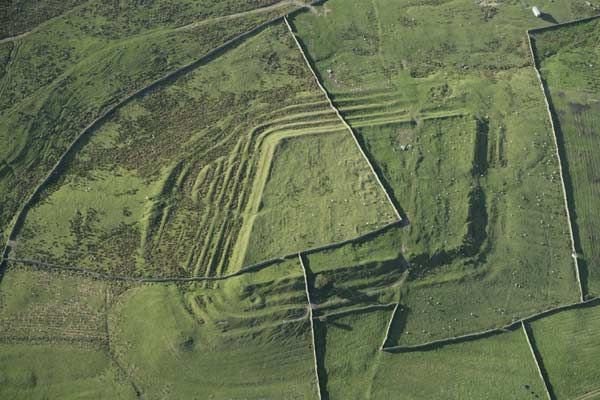
Historical Significance
- Built: Early 2nd century AD, around the same time as Hadrian’s Wall.
- Purpose: Housed a garrison of about 500 auxiliary soldiers, likely to control the area’s rich lead and silver mining operations.
- Unique Features: Distinctive lozenge (parallelogram) shape, adapted to the hill’s contours, and surrounded by an elaborate system of defensive ditches and ramparts considered the most complex in the Roman Empire.
- Archaeology: Remains of barracks, headquarters, bathhouse, and a temple dedicated to Emperor Caracalla. Artefacts include altars, inscriptions, pottery, coins, and tools, offering insight into Roman military and civilian life.
Location & Access
- Setting: Located on Castle Nook hill farm, about 3 miles northwest of Alston, adjacent to the Pennine Way and Isaac’s Tea Trail.
- Access: Car park on the A689 with a permissive access trail; also accessible via walking routes from the South Tyne Trail and Pennine Way.
- Terrain: Rough, steep, and uneven; sturdy, waterproof footwear is recommended.
- Open Access: The site is on private farmland but is a Scheduled Ancient Monument with open access during daylight hours. No admission charge; donations welcome for conservation.
Visitor Experience
- Walking Trails: Self-guided trails and leaflets help visitors explore the fort and its surroundings, with educational panels and a family-friendly “Venatus Trail.”
- The Nook Farm Shop & Café: Located nearby, offering refreshments, local produce, and information about the fort.
- Events & Education: Managed by Epiacum Heritage Ltd., the site hosts guided tours, archaeological survey days, and educational events throughout the year.
- Photography: The fort’s earthworks and panoramic views of the North Pennines make it a popular spot for landscape and heritage photography.
Practical Information
- Location: Castle Nook Hill Farm, near Alston, Cumbria
- Elevation: Approx. 1,050 feet (330 meters) above sea level
- Access: Car park on A689; walking routes from Pennine Way & South Tyne Trail
- Terrain: Rough, steep, uneven; suitable footwear required
- Admission: Free; donations welcome
- Facilities: Nearby café and farm shop (The Nook), information panels
- Opening Hours: Open year-round during daylight hours
- Conservation Status: Scheduled Ancient Monument
Why Visit Epiacum Roman Fort?
- One of Britain’s best-preserved Roman forts, with unique earthworks and a rare lozenge-shaped design.
- Stunning panoramic views of the North Pennines landscape.
- Rich archaeological finds and educational resources for all ages.
- Accessible walking trails and a welcoming community-led conservation effort.
- Combine your visit with refreshments at The Nook Farm Shop & Café and explore nearby walking routes.
Epiacum Roman Fort offers a fascinating glimpse into Roman frontier life and upland history, set amidst the wild beauty of the North Pennines. It’s a rewarding destination for history lovers, walkers, and families alike.
Nenthead Mines: Guided Tours and the Lives of Past Miners
Nenthead Mines, located near Alston in Cumbria, is one of the most significant historic mining sites in the North Pennines. Once a thriving centre for lead and zinc mining, the site now offers visitors a unique opportunity to step back in time and experience the tough, ingenious world of the miners who shaped this remote valley.
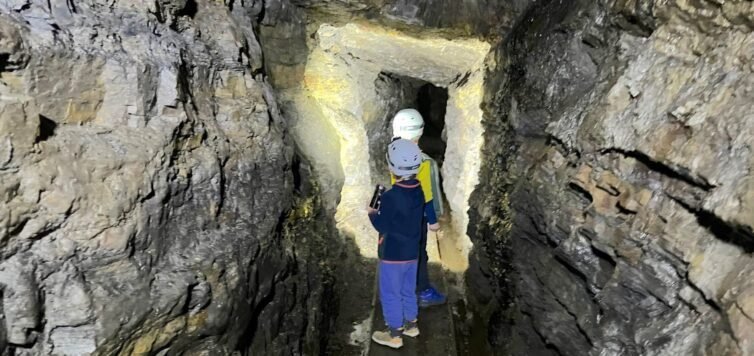
Guided Underground Tours: Carrs Mine
The highlight of a visit to Nenthead Mines is a guided tour of Carrs Mine. These tours, run by knowledgeable volunteers, last about 90 minutes and take you deep underground to explore original mine tunnels, shafts, and chambers. Along the way, guides demonstrate old mining methods, explain the geology, and share stories of the miners’ daily lives. You’ll see fluorescent minerals, learn about the tools and techniques used, and get a real sense of the challenging conditions faced by those who worked here.
- Equipment Provided: Helmets and lamps are supplied. Visitors are advised to wear warm, outdoor clothing and sturdy footwear, as the mine is a cool 8°C and can be muddy in places.
- Who Can Join: Tours are suitable for all ages who can walk and climb stairs (babes in arms are not permitted underground).
- Atmosphere: The experience is both educational and atmospheric, with the dimly lit tunnels and stories of hard labour bringing the miners’ world vividly to life.
- Donations: A suggested donation of £11 for adults and £5 for children supports the volunteer-run site.
What You’ll Learn and Experience
- Mining Heritage: Discover how the London Lead Company and later operators developed an extensive network of tunnels, some over 600 feet deep, using advanced Victorian technology for water management and ore extraction.
- Working Conditions: Learn about the tough, often dangerous lives of miners, including long hours, hazardous work, and the innovations that improved safety and efficiency over time.
- Industrial Archaeology: Explore restored buildings such as the smelt mill and blacksmith’s shop, and see original equipment and artefacts that tell the story of the mining community.
- Geology and Nature: The site is also notable for its rare lichens and plants growing on metal-rich mine dumps, and is set within the scenic North Pennines Area of Outstanding Natural Beauty.
Visitor Information
- Open Days: Guided tours of Carrs Mine are available on scheduled Open Days from spring to autumn. Check the Nenthead Mines website for current dates and booking information.
- Group Visits: Custom group tours can be arranged outside regular Open Days (except July and August), with advance notice and a minimum donation.
- Facilities: The site includes a small museum, interpretation displays, and walking trails. After your tour, you can visit the top of the 100-metre-deep Brewery Shaft and learn about the use of renewable energy in mining.
- Location: Nenthead, near Alston, Cumbria. Main access via the A689; SatNav postcode: CA9 3NR.
Why Visit Nenthead Mines?
- Experience the atmosphere of a real Victorian mine and gain insight into the lives of the miners who worked in challenging and often dangerous conditions.
- Learn about the technological innovations and social history that made Nenthead a pioneering industrial community.
- Enjoy the stunning scenery of the North Pennines and explore walking trails around the historic site.
- Support a volunteer-run heritage site dedicated to preserving and sharing the region’s unique mining legacy.
A visit to Nenthead Mines is both an adventure and an education, perfect for history enthusiasts, families, and anyone curious about the industrial past of the North Pennines.
Alston Heritage Trail: A Self-Guided Walk Through History
The Alston Heritage Trail is a self-guided walking route that invites visitors to explore the rich history, architecture, and culture of Alston, one of England’s highest market towns. The trail connects key historic sites and viewpoints, offering a fascinating journey through cobbled streets, hidden courtyards, and the scenic landscapes of the North Pennines.
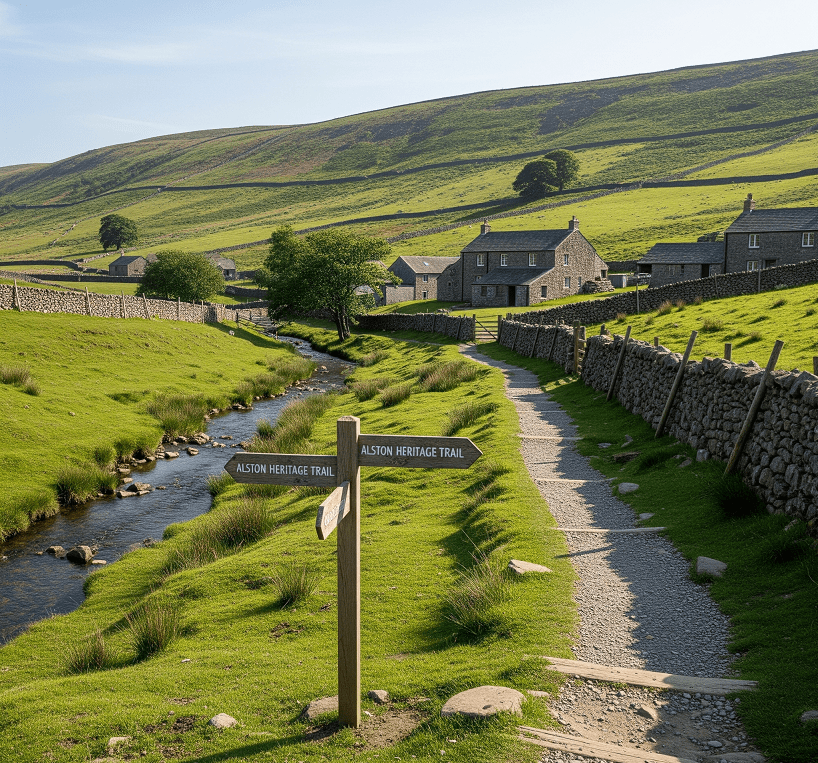
Trail Overview
This trail is designed for flexibility: there is no fixed start or end point, allowing you to explore Alston’s heritage at your own pace. Leaflets with maps and site information are available from the Alston Tourist Information Centre, and many sites feature informative plaques or panels. Most locations are accessible on foot, with some also reachable by car or public transport. The trail is family-friendly and suitable for all ages, though some areas may have limited accessibility.
Key Sites on the Alston Heritage Trail
- Market Cross: The heart of Alston, this 18th-century shelter is a symbol of the town’s market heritage and a great starting point for your walk. Surrounded by historic stone buildings and cobbled streets, it’s a hub for local events and gatherings.
- Alston Town Hall: Built in 1857, the Town Hall once housed the Literary and Mechanic's Institute, a reading room, and the boardroom for the Poor Law Guardians. It remains a focal point for community life and local history.
- St. Augustine’s Church: The site of at least three churches since the 12th century, the current Victorian church features beautiful stained glass and a unique clock with a storied past. The churchyard offers a tranquil green space in the town centre.
- South Tynedale Railway: England’s highest narrow-gauge railway, offering scenic rides through the South Tyne Valley. The station area includes a discovery museum and an engineering workshop viewing gallery.
- Nenthead Mines: Once a major centre for lead and zinc mining, the site now offers guided underground tours and displays on the area’s industrial heritage. The surrounding landscape is dotted with remnants of the mining era.
- Killhope Lead Mining Museum: A preserved 19th-century mining complex where visitors can experience Victorian mining life, see the impressive Killhope Wheel, and try panning for minerals.
- The Hive at Nenthead: Located in a model village built by the London Lead Mining Company, this restored chapel now serves as an arts and exhibition space with a welcoming café.
- Epiacum Roman Fort (Whitley Castle): The highest stone-built Roman fort in Britain, featuring dramatic earthworks and panoramic views. Two visitor trails, one educational, one family-friendly, help you explore the site’s Roman history.
What to Expect
- Informative Panels: Many sites along the trail have plaques or boards detailing their history and significance.
- Flexible Exploration: There is no set route; choose your own path and spend as much time as you like at each location.
- Family-Friendly: The trail is suitable for all ages, with plenty of opportunities for learning and discovery.
- Accessibility: Most sites are easy to reach, though some may have limited wheelchair access or require walking on uneven surfaces.
- Scenic Views: Enjoy sweeping vistas of the North Pennines, rivers, and moorland as you walk between sites.
How to Get Started
- Pick up a leaflet and map from the Alston Tourist Information Centre (Town Hall, Alston).
- Download the Eden Heritage Trail app for additional information and digital navigation.
- Check opening times for museums and guided tours if you wish to go inside or underground at certain sites.
- Wear comfortable shoes and be prepared for changeable weather, especially if you plan to explore the surrounding countryside.
The Alston Heritage Trail is a rewarding way to discover the town’s unique character, from its mining legacy and Roman roots to its vibrant community life. Whether you’re a history enthusiast, a family, or a casual visitor, this self-guided walk offers a memorable and educational experience in the heart of the North Pennines.
Outdoor Activities & Scenic Landscapes
Walking & Hiking: Explore Alston’s Iconic Trails and Sweeping Moorland Views
Alston is a walker’s paradise, surrounded by some of the most dramatic and unspoiled landscapes in England. Whether you’re seeking a gentle riverside stroll or a challenging moorland trek, the area’s renowned long-distance trails and local routes offer something for every level of experience. Here’s a closer look at the three most celebrated trails accessible from Alston:
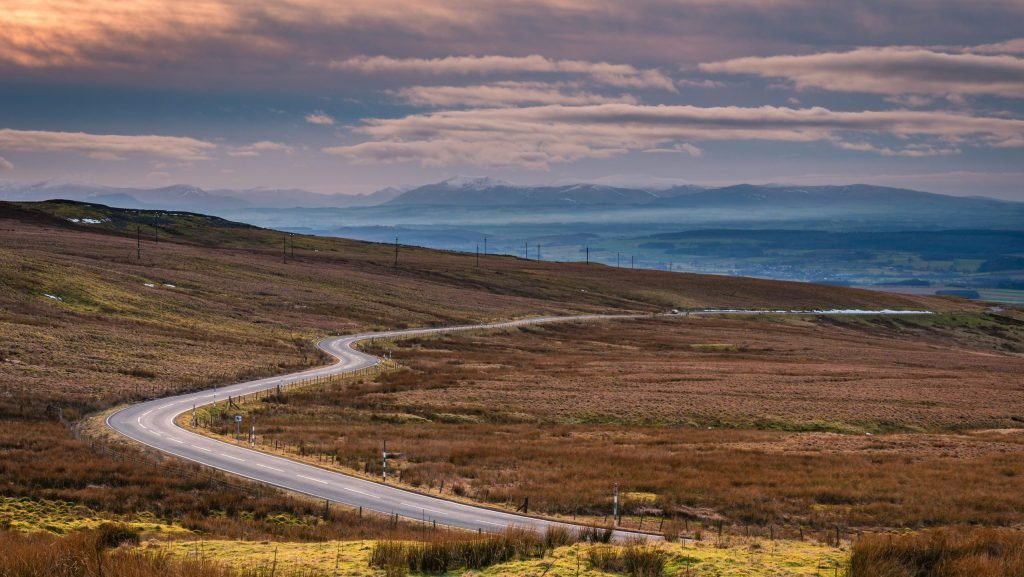
The Pennine Way
The legendary Pennine Way is Britain’s oldest and most iconic National Trail, stretching 268 miles (431 km) from Derbyshire to the Scottish Borders. Alston is a key milestone on the route, and the surrounding section is famed for its wild, open moorland, remote valleys, and far-reaching views. Walkers can tackle shorter sections from Alston, such as:
- Alston to Greenhead: A 16.5-mile (26 km) stage following the River South Tyne northwards, passing through farmland, fells, and the Roman fort of Epiacum (Whitley Castle). This stretch is known for its peaceful solitude and classic Pennine scenery, with options to shorten the walk or combine it with the South Tyne Trail for a circular route.
- Alston to Garrigill: A shorter, scenic walk south along the Pennine Way, following the River South Tyne and offering panoramic views of the surrounding hills and moorland. This section is popular for its wildlife and wildflower meadows in spring and summer.
Isaac’s Tea Trail
Isaac’s Tea Trail is a 36-mile (58 km) circular route inspired by the journeys of Victorian tea seller and philanthropist Isaac Holden. The trail links Allendale, Nenthead, Alston, and Ninebanks, traversing wild moors, riverside paths, and historic mining landscapes. Walkers can enjoy:
- Alston to Ninebanks: A 10.2-mile (16.4 km) section of medium difficulty, taking in Kirkhaugh Church, the River South Tyne, and panoramic views from Ouston Fell before descending into the West Allen Valley. The route is well waymarked and offers a mix of riverside, woodland, and open moorland walking.
- Shorter Loops: The trail is divided into four main sections, allowing walkers to choose day walks or multi-day adventures. Expect to encounter relics of the area’s mining heritage, wildflowers, and sweeping vistas across the North Pennines.
South Tyne Trail
The South Tyne Trail is a 23-mile (36.5 km) route following the River South Tyne from its source near Garrigill to Haltwhistle. Open to both walkers and cyclists, the trail offers:
- Alston to Slaggyford: A popular 5.5-mile (9 km) stretch that runs alongside the South Tynedale Railway, featuring riverside scenery, wooden footbridges, and the option to return by heritage train. This route is family-friendly, dog-friendly, and ideal for wildlife spotting.
- Full Trail Experience: Walkers can continue north to the spectacular Lambley Viaduct and on to Haltwhistle, or south towards Garrigill and the river’s source. The trail is mostly flat with gentle gradients, making it accessible for a range of abilities.
Other Notable Walks
- Ashgill Force Waterfall Walk: A short, easy circular walk to one of Cumbria’s most impressive waterfalls, perfect for families and photographers.
- Alston Heritage Trail: A self-guided walk through the town’s historic sites, market squares, and cobbled streets, offering insight into Alston’s rich past.
- Cow Green Reservoir and Cauldron Snout: For a wilder adventure, head to the upper Teesdale for dramatic reservoir and waterfall walks with rare flora and birdlife.
Tips for Walkers
- Always carry a map, compass, and appropriate clothing weather can change quickly on the fells.
- Many routes are waymarked, but some moorland sections can be remote and exposed.
- Local cafes, pubs, and accommodations welcome walkers and often provide packed lunches or refreshments along the way.
- Check train and bus times if planning linear walks, especially for the South Tyne Trail and Pennine Way stages.
Whether you’re tackling a legendary long-distance path or enjoying a gentle riverside ramble, Alston’s walking and hiking opportunities promise unforgettable views, rich history, and a true sense of adventure in the heart of the North Pennines.
Cycling: Challenging Hill Climbs and Scenic Valley Rides in Alston
Alston and the North Pennines offer some of the most exhilarating and scenic cycling experiences in England. The area’s upland terrain features a mix of challenging hill climbs, rolling moorland, and peaceful valley routes, catering to both road cyclists and mountain bikers.

Challenging Hill Climbs
The region’s varied topography means cyclists can expect steep ascents and thrilling descents. Notable climbs include the famous Hartside Pass, part of the renowned Coast to Coast (C2C) cycle route, which rewards riders with breathtaking panoramic views at the summit. Other demanding routes include the ascent to Flinty Fell and the hills around Garrigill and Nenthead, all of which test endurance and skill.
Scenic Valley Rides
For those seeking a more relaxed pace, the valleys of the River South Tyne and River Nent provide tranquil cycling routes with stunning natural beauty. These rides often follow quiet country lanes and traffic-free paths, allowing cyclists to enjoy the peaceful countryside, historic villages, and abundant wildlife along the way.
Mountain Biking and Off-Road Trails
Mountain biking enthusiasts will appreciate the Alston Packhorse Trail, an 18-mile circular route that includes 30% off-road sections and 912 meters of ascent. This trail passes through historic mining landscapes and offers a mix of terrain suitable for experienced riders. Other off-road routes cater to various skill levels, with some requiring advanced mountain biking abilities due to rough and wet sections.
Bike Hire in Alston
Visitors who do not bring their own bikes can easily rent from local shops such as North Pennine Cycles, which offers a range of bicycles, including road bikes, mountain bikes, and e-bikes. The shop also provides repairs and advice, making it a convenient resource for cyclists exploring the area.
Popular Cycle Routes
- Coast to Coast (C2C) Cycle Route: Alston is a key milestone on this iconic route, which stretches from the Irish Sea to the North Sea, featuring a mix of challenging climbs and rewarding descents.
- Pennine Cycleway: This national cycle route passes through Alston, offering varied terrain and scenic views.
- Alston to Blanchland Loop: A favourite local ride combining climbs, descents, and quiet country lanes through picturesque villages and reservoirs.
- Cross Fell Challenge: For experienced cyclists, this route includes steep climbs and rugged terrain, culminating at the highest point in the Pennines.
Tips for Cycling in Alston
- Prepare for variable weather by dressing in layers and carrying waterproofs.
- Bring a detailed map or GPS device, as some routes include remote and off-road sections.
- Stay hydrated and carry snacks, especially on longer or more challenging rides.
- Respect the environment by following the Countryside Code and sticking to designated paths.
- Check local bike hire availability and book in advance during peak seasons.
Whether you’re a seasoned road cyclist, a mountain biking enthusiast, or a casual rider, Alston’s diverse cycling opportunities and stunning landscapes make it a must-visit destination for two-wheeled adventures.
Birdwatching & Wildlife: Discover Alston’s Natural Riches
Alston and the North Pennines are a haven for wildlife enthusiasts and birdwatchers, offering a remarkable diversity of species in their natural habitats. The area’s mix of heather moorland, ancient woodlands, rivers, and meadows supports a rich array of birds and mammals, many of which are rare or declining elsewhere in the UK.

Birdwatching Highlights
- Curlew: The haunting call of the curlew is a signature sound of Alston’s uplands in spring and summer. These elegant waders, with their long, curved bills, nest in the grasslands and moorland, often seen probing for insects and worms. The North Pennines is one of the UK’s strongholds for curlews, which are now a globally threatened species.
- Red Grouse & Black Grouse: The heather moors around Alston are home to red grouse year-round, while the rare black grouse can be spotted at dawn during their spectacular spring “lekking” displays on the moorland fringes and open woodland edges.
- Golden Plover & Lapwing: These striking waders breed on the high moors and blanket bogs. Golden plovers are especially eye-catching in their gold-spangled breeding plumage, while lapwings are known for their tumbling flight and distinctive “peewit” calls.
- Birds of Prey: The area supports merlin (Britain’s smallest falcon), kestrel, buzzard, and the rare hen harrier, which can sometimes be seen gliding low over the moors in search of prey. Short-eared owls and barn owls also hunt the open grasslands at dusk.
- Woodland & River Birds: In the woods and along the South Tyne, look for pied flycatchers, redstarts, dippers (with their bobbing white throats), and grey wagtails. The rivers and streams are also home to kingfishers and the occasional otter.
Wildlife Watching: Mammals and More
- Red Squirrels: Alston is one of the last strongholds for native red squirrels in England. These charismatic mammals are often seen in local woodlands and gardens, especially where conservation groups work to protect them from invasive grey squirrels. Look for their bushy tails and tufts of fur on their ears, particularly in autumn and winter. Local volunteer groups and sanctuaries help monitor and support the population, and sightings are still common in the area despite national declines.
- Deer: Roe deer and, occasionally, red deer roam the woodlands and fields around Alston. Early morning or dusk are the best times to spot these shy animals grazing at the woodland edge or crossing quiet lanes.
- Other Mammals: The area is also home to badgers, foxes, hares, and water voles. Otters, once rare, are now making a comeback and may be glimpsed along the quieter stretches of the River South Tyne, especially at dawn or dusk.
Best Places for Birdwatching & Wildlife in Alston
- RSPB Geltsdale Reserve: A short drive from Alston, this reserve is renowned for black grouse, curlew, golden plover, and birds of prey. Well-marked trails and hides make it accessible for all levels of birdwatchers.
- South Tynedale Railway Path: This scenic route follows the river and passes through a mosaic of habitats, offering chances to see dippers, wagtails, and woodland birds.
- Isaac’s Tea Trail & Pennine Way: These long-distance trails traverse moorland, woodland, and river valleys, providing excellent opportunities to spot upland birds, mammals, and wildflowers.
- Garrigill & Local Woodlands: The village of Garrigill and its surrounding fields and hedgerows are good for farmland birds, red squirrels, and deer.
Seasonal Highlights & Conservation
Spring and early summer are the best times for birdwatching, with breeding displays and the arrival of migratory species. Autumn brings the deer rut and flocks of waders, while winter offers the chance to see hardy species like red grouse and, with luck, tracks of otters or badgers in the snow. Conservation efforts in the North Pennines are vital for protecting rare species such as the hen harrier, black grouse, and red squirrel, and visitors are encouraged to follow the Countryside Code to help safeguard these precious habitats.
Whether you’re a keen birder, a wildlife photographer, or simply enjoy a quiet walk in nature, Alston’s fells, woodlands, and rivers promise memorable encounters with some of Britain’s most iconic and elusive wildlife.
Fishing: Cast for Trout, Grayling, and Salmon in the River South Tyne
The River South Tyne at Alston is renowned as one of England’s finest angling destinations, offering a rewarding experience for both seasoned anglers and beginners. The river meanders through the North Pennines Area of Outstanding Natural Beauty, providing a stunning backdrop for a day on the water. Here, you can fish for wild brown trout, grayling, and during the summer and autumn sea trout and salmon, all in clear, fast-flowing upland waters.

What You Can Catch
- Brown Trout: Wild and abundant throughout the river and its tributaries, offering excellent sport from spring through autumn.
- Grayling: Present in good numbers, especially in the cooler months, and prized for their fighting spirit and beauty.
- Sea Trout & Salmon: The South Tyne is famous for its summer and autumn runs. Sea trout average around 4lb, with larger specimens possible. Salmon fishing is best from June to October, with fish in prime condition early in the season.
Where to Fish
Nearly 10 miles of fishing beats on the River South Tyne, from Eals Village upriver to Alston, are managed by the Alston Angling Association. These beats offer a mix of deep pools, fast runs, and glides ideal for fly fishing and spinning. Some nearby streams and tributaries also hold wild trout and grayling, providing quieter spots for those seeking solitude.
Permits and Access
- Permits Required: All anglers must hold a valid day ticket or permit to fish the managed beats. Day tickets are available from the Alston Post Office and online via the FishPal website.
- Permit Cost: As of July 2022, a day ticket costs £35 per rod. Up to eight rods are available daily on the Alston Angling Association waters.
- Season: The main fishing season for salmon and sea trout runs from June to October 31st. Trout and grayling can be caught outside these dates, but always check local regulations before fishing.
- Environment Agency Rod Licence: In addition to a local permit, all anglers aged 13 and over must hold a valid Environment Agency rod licence.
Guided Fishing and Local Advice
For those new to the area or seeking to improve their skills, expert guides such as James Stokoe (as seen on TV) offer tailored tuition and local insight. Whether you’re a beginner or an experienced angler, a guide can help you get the most from your time on the river.
Tips for a Great Day’s Fishing
- Check river levels and weather before setting out spate conditions can affect fishing.
- Bring appropriate tackle: a 13–14ft rod is recommended for salmon and sea trout; lighter rods for trout and grayling.
- Practice catch and release where possible to help conserve fish stocks.
- Wear waders and bring insect repellent, especially in summer.
- Respect private land and follow the Countryside Code at all times.
With its rich fish stocks, scenic beauty, and well-managed access, the River South Tyne around Alston is a hidden gem for anglers. Whether you’re casting for wild trout in a quiet stream or chasing the thrill of a summer salmon, you’ll find a memorable fishing experience in this unspoiled corner of Cumbria.
Golf: Tee Off at Alston Moor Golf Club, One of England’s Highest Courses
Alston Moor Golf Club offers a truly unique golfing experience as the highest golf course in England, perched at an impressive 1,476 feet (450 metres) above sea level. Set amidst the dramatic landscapes of the North Pennines Area of Outstanding Natural Beauty, the course combines challenging play with breathtaking panoramic views of the Cumbrian countryside.
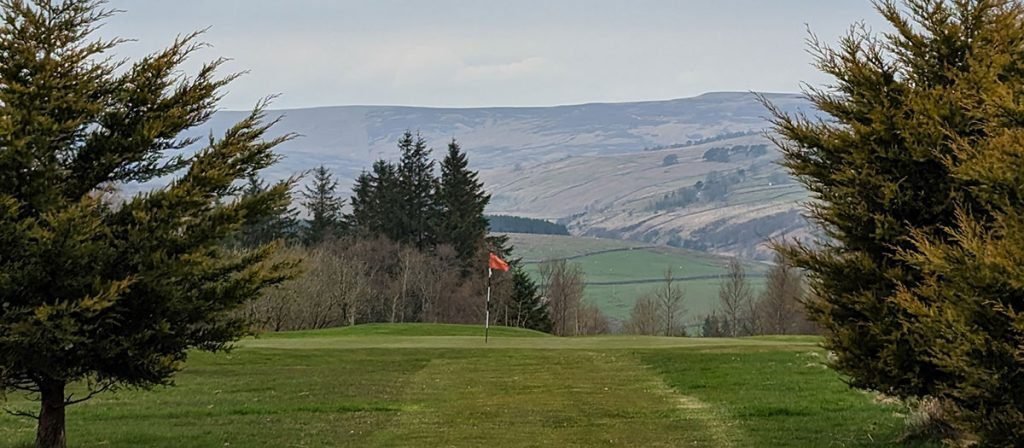
Course Features
- Layout: The course is designed as a 10-hole parkland layout, but with 18 separate tee positions, allowing golfers to play a full 18-hole round with varied challenges on each loop.
- Yardage & Par: The 18-hole course measures approximately 5,364 yards from the white tees, with a par of 68 for men and 71 for women.
- Terrain: Expect undulating fairways, natural hazards, stone walls, and occasional livestock sheep are a common sight! The course is hilly, with significant elevation changes, making for a memorable and sometimes demanding walk.
- Views: Enjoy sweeping vistas across the Pennines, with the course’s elevated position providing some of the best scenery of any golf course in England.
- Accessibility: The club is located about 2 miles south of Alston, with ample free parking and a welcoming, relaxed atmosphere for visitors of all abilities.
Facilities & Visitor Information
- Clubhouse: A friendly clubhouse offers a bar, snacks, and catering, with a sun terrace for enjoying post-round refreshments and the views.
- Green Fees: Alston Moor is known for its affordable green fees, with walk-on prices from around £13–£15 for 18 holes. An honesty box system is often used for payment, making golf here accessible and welcoming.
- Equipment: Golfers should bring their own clubs and gear. Pull carts are available, but there is no driving range or equipment rental on site.
- Season: The course is open year-round, weather permitting, but conditions can be challenging in winter due to its upland location. Always check ahead for course status during snowy or wet periods.
- Atmosphere: With a small, friendly membership and a remote setting, the course is rarely crowded, allowing golfers to play at their own pace and soak up the peaceful surroundings.
Why Play at Alston Moor Golf Club?
- Unique Setting: Experience golf at the highest elevation in England, with ever-changing weather and light creating a new challenge every round.
- Scenic Beauty: The course’s location within the North Pennines AONB means you’ll enjoy some of the most spectacular views in the country as you play.
- Challenging Play: The combination of elevation changes, natural hazards, and exposed fairways tests golfers of all skill levels while remaining fun and accessible.
- Welcoming Community: Visitors are warmly welcomed, and the relaxed, unhurried pace makes it ideal for both serious golfers and those seeking a memorable day out in the countryside.
Practical Information
- Address: The Hermitage, Middleton Road, Alston, Cumbria, CA9 3DB
- Phone: 01434 381675
- Email: secretary@alstonmoorgolfclub.org.uk
- Website: alstonmoorgolfclub.org.uk
- Green Fees: £13–£15 for 18 holes (subject to change)
- Facilities: Clubhouse, bar, snacks, free parking, pull carts
- Open: Year-round (weather permitting)
Whether you’re a keen golfer or simply want to experience a round in one of England’s most scenic and elevated settings, Alston Moor Golf Club promises a memorable day out in the heart of the North Pennines.
Winter Sports: Skiing, Sledging, and Snowy Adventures in Alston
Alston and the North Pennines transform into a winter playground when the snow arrives, offering a range of classic British winter sports for all ages and abilities. Whether you’re an experienced skier, a family looking for sledging fun, or simply want to enjoy the crisp upland air, there’s something for everyone during the snowy months.

Skiing at Yad Moss
Yad Moss is one of England’s best-known real-snow ski areas, located just 11 km south of Alston in the North Pennines. Run by a dedicated community club, Yad Moss offers over 4 km of varied intermediate ski runs and off-piste terrain when conditions allow. The ski area sits between 600m and 720m above sea level and is served by England’s longest ski tow, a 600m Poma lift with a 125m vertical rise, providing access to runs up to 800m in length. All runs are graded blue, but the natural, ungroomed terrain and thin snow cover can make for a fun and challenging experience.
Yad Moss is open to skiers, snowboarders, and telemarkers, but snow is highly variable and the club reacts quickly to favourable weather, so be ready to seize the moment! In a good season, there can be over 40 days of skiing, with the first runs as early as November and the last as late as April. Facilities include a day lodge with heating and toilets, but you’ll need to bring your own equipment, food, and drinks, as there is no rental or catering on site. Day tickets are available, and all proceeds go back into maintaining the club and facilities. For the latest snow conditions and opening times, check the Yad Moss website or call their snowline before travelling.
Sledging and Family Snow Fun
When the snow falls, Alston’s hills and open spaces become perfect for sledging and family fun. The gentle slopes around the town, local parks, and the South Tyne Trail offer safe and accessible spots for children and adults alike to enjoy classic sledging. Bring your own sledge or improvise with a sturdy tray. Just remember to dress warmly and supervise young children, especially near roads or rivers. After a day in the snow, warm up in one of Alston’s cosy cafes or pubs with a hot chocolate or hearty meal.
Other Winter Sports and Activities
- Cross-country skiing: The open dales and high plateaus of the North Pennines are ideal for cross-country skiing when snow conditions allow. The area’s open access rights mean you can explore a variety of routes, just be prepared for changeable weather and bring appropriate gear.
- Winter walking: Hardy walkers are rewarded with stunning, snow-dusted landscapes and crisp, clear air. Always check weather and trail conditions before heading out, and carry appropriate winter gear.
- Nearby ski clubs: For more options, the Weardale and Allenheads ski clubs are within easy reach and offer additional slopes and facilities for both beginners and experienced skiers.
Whether you’re carving turns at Yad Moss, sledging with the family, or simply enjoying the snowy scenery, Alston is a wonderful base for winter sports and adventures in the North Pennines. Always check local weather and snow conditions before setting out, and be prepared for rapidly changing upland weather.
Stargazing: Alston’s Dark Skies and Night-Sky Experiences
Alston is a stargazer’s paradise, thanks to its remote upland setting and exceptionally low levels of light pollution. The town sits within the North Pennines, officially recognised as the darkest mainland Area of Outstanding Natural Beauty (AONB) in England. On clear nights, thousands of stars are visible to the naked eye, including the Milky Way, major constellations, and even distant planets. The area’s pristine skies make it one of the best places in the UK for astronomy and night-sky photography.

Why Alston is Ideal for Stargazing
- Minimal Light Pollution: Far from city lights, Alston’s skies remain naturally dark, allowing for spectacular views of stars, meteor showers, and even the Andromeda Galaxy on moonless nights.
- Dark Sky Discovery Sites: The North Pennines boasts more nationally recognised Dark Sky Discovery Sites than anywhere else in the UK, with several easily accessible from Alston, including Cow Green Reservoir and Grassholme Reservoir.
- Panoramic Vistas: The open moorland and elevated position provide unobstructed horizons, perfect for observing celestial events and tracking the movement of the stars across the sky.
Alston Moor Observatory
Opened in 2024 at Alston Moor Golf Club, the Alston Moor Observatory features a state-of-the-art 2.2m Pulsar Dome housing a powerful 11-inch Celestron telescope. The observatory is designed for both public and group use, with the telescope’s live images viewable in the clubhouse for up to 30 people. The facility hosts regular stargazing events, educational sessions, and is available for private bookings. For details or to arrange a visit, contact admin@alstonmoorobservatory.org.
What You Can See
- Constellations: Spot Orion, Cassiopeia, the Plough, and many more with the naked eye.
- The Milky Way: On moonless nights, the Milky Way appears as a bright, misty band stretching across the sky.
- Planets: Venus, Mars, Jupiter, and Saturn are often visible, sometimes even without a telescope.
- Meteor Showers: Annual events like the Geminids (December) and Perseids (August) offer the chance to see dozens of shooting stars per hour.
- Northern Lights: On rare occasions, the aurora borealis can be glimpsed low on the northern horizon.
Stargazing Events and Festivals
Alston and the wider North Pennines host a variety of stargazing events throughout the year, including the annual North Pennines Stargazing Festival each autumn. These events feature expert astronomers, guided night-sky tours, telescope demonstrations, and family-friendly activities. Some local pubs and hotels also offer “stargazing suppers” and themed evenings during festival weeks.
Tips for Stargazing in Alston
- Check the weather forecast and aim for clear, moonless nights for the best visibility.
- Allow your eyes 20–30 minutes to adjust to the darkness.
- Bring a red-light torch to preserve night vision.
- Dress warmly upland nights can be chilly, even in summer.
- Use a star chart or astronomy app to help identify constellations and planets.
- For the best experience, join a guided event or visit the Alston Moor Observatory.
Whether you’re a seasoned astronomer or simply want to marvel at the night sky, Alston’s dark skies promise a magical and unforgettable stargazing experience.
Family Picnics: Scenic Spots in and around Alston
Alston and the surrounding North Pennines offer a wealth of beautiful picnic locations, perfect for families seeking a relaxing meal outdoors with stunning views. Whether you prefer riverside tranquillity, dramatic waterfalls, or sweeping hillside panoramas, you’ll find plenty of inviting spots to spread out a blanket and enjoy the fresh air.
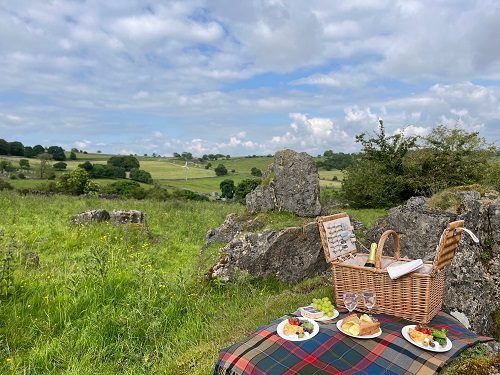
Top Picnic Locations
- South Tyne Trail Picnic Area: Just beside Alston Railway Station, you’ll find a dedicated picnic area close to the River South Tyne. This spot offers easy access, free parking, and a gentle riverside setting ideal for families with children. After your picnic, you can stroll along the South Tyne Trail, watch heritage trains, or explore the nearby town centre. The area is flat and accessible, making it suitable for prams and wheelchairs.
- Ashgill Force Waterfall: For a more adventurous outing, head to Ashgill Force near Garrigill. A short, scenic walk leads you to this spectacular 55-foot waterfall, where you’ll find open grassy areas perfect for a picnic. The sound of cascading water and the surrounding wildflowers create a magical atmosphere. Children can explore the riverbanks (with supervision), and there are plenty of photo opportunities. The walk is suitable for most ages, though sturdy footwear is recommended.
- Cow Green Reservoir: Located a short drive from Alston, Cow Green Reservoir boasts a beautiful picnic area overlooking the water. There’s ample parking, a portable toilet on site, and plenty of space for families to relax. The reservoir is surrounded by rolling hills and wild moorland, offering panoramic views and a sense of peaceful seclusion. It’s a great base for a walk to Cauldron Snout waterfall or simply to enjoy the scenery and spot local wildlife.
- Hillside and Moorland Spots: The hills and fells around Alston are dotted with quiet places to picnic, from grassy banks along Isaac’s Tea Trail to viewpoints on the Pennine Way. Many routes offer benches or natural perches with sweeping views across the valleys, perfect for a family lunch with a backdrop of heather and stone walls.
Tips for a Perfect Family Picnic
- Bring a blanket or portable chairs for comfort, as many spots are grassy or uneven.
- Pack a rubbish bag and take all litter home to help keep the countryside pristine.
- Supervise children near water and on steep paths, especially at waterfalls and riversides.
- Check the weather and dress in layers; upland weather can change quickly.
- Consider bringing binoculars for birdwatching and a camera to capture the views.
Whether you’re looking for a riverside retreat, a dramatic waterfall backdrop, or a quiet hillside with panoramic views, Alston’s picnic spots promise memorable family moments surrounded by the natural beauty of the North Pennines.
Planning Your Trip: Practical Tips
When to Visit
Alston is a year-round destination, with each season offering its own unique charm and experiences. Here’s what to expect throughout the year, along with tips for making the most of your visit:
Spring (March – May)
Spring brings a sense of renewal to Alston and the North Pennines. The landscape bursts into life with wildflowers, blossoming trees, and the return of migratory birds. Days grow longer and temperatures begin to rise, making it an ideal time for walking, cycling, and wildlife watching. Local events and markets start to pick up, and the countryside is especially peaceful before the summer crowds arrive.
Summer (June – August)
Summer is the most popular time to visit, with lush green hills, vibrant meadows, and a full calendar of outdoor events and festivals. The weather is generally mild, though occasional rain showers are common so pack accordingly. This is the best season for hiking the Pennine Way, enjoying picnics by the river, and taking part in local fairs, art festivals, and open gardens. Longer daylight hours mean more time to explore the area’s trails and attractions.
Autumn (September – November)
Autumn transforms Alston into a tapestry of gold, red, and amber as the leaves change across the fells and woodlands. The air is crisp and clear, perfect for scenic walks and photography. This is a quieter time to visit, with fewer tourists and a slower pace. Harvest festivals and food events celebrate local produce, and the landscape is especially beautiful for those seeking tranquillity and dramatic views.
Winter (December – February)
Winter in Alston is magical, with the town and surrounding hills often blanketed in snow. The area becomes a haven for sledging, winter walks, and even skiing at nearby Yad Moss when conditions allow. Pubs and inns offer cosy fires and hearty meals, making it a wonderful time for a peaceful retreat. However, the upland location means weather can be unpredictable, snow and ice are common, and some roads may be temporarily closed. Always check local weather and road conditions before travelling, and allow extra time for your journey in winter months.
Seasonal Tips
- Book accommodation early for summer and during local festivals, as Alston is a popular base for walkers and cyclists.
- Pack layered clothing and waterproofs year-round, as weather can change quickly in the North Pennines.
- Check event calendars for local fairs, art festivals, and guided walks, many are seasonal and add to the experience.
- In winter, carry emergency supplies in your car, check road conditions, and be prepared for possible travel delays.
No matter when you visit, Alston’s natural beauty, welcoming community, and rich heritage ensure a memorable stay in every season.
Getting There
Alston is accessible by several scenic routes and offers a range of travel options, though its remote upland location means planning ahead is essential.
By Car
Driving is the most flexible and popular way to reach Alston. The town is served by three main roads:
- A686: Approaches from Penrith and the M6, passing through dramatic moorland scenery and the famous Hartside Pass—often cited as one of England’s most beautiful drives.
- A689: Connects Alston with Brampton, Nenthead, and Bishop Auckland, offering access from the east and west.
- B6277: Runs south towards Middleton-in-Teesdale, with sweeping views across the North Pennines.
All routes are well maintained but can be steep, winding, and exposed, especially in winter, when snow and ice may cause temporary closures. Always check local weather and road conditions before travelling, particularly between November and March. There is ample free parking in and around Alston town centre, making it easy for drivers to explore on foot.
By Public Transport
Train: The nearest mainline railway station is Penrith (North Lakes), about 20 miles (32 km) from Alston. Penrith is on the West Coast Mainline, with regular direct services to London, Glasgow, Manchester, and other major cities.
Bus: Alston is served by a limited number of bus routes, some of which are seasonal or operate only on certain days:
- Service 888 (Wright Bros Coaches): Runs between Newcastle, Alston, Penrith, and Keswick on Fridays, Saturdays, Sundays, and Mondays from mid-July to late September. This route follows the spectacular A686 and connects with Penrith rail and bus stations. No advance booking—pay the driver in cash.
- Service 681: Connects Alston with Haltwhistle and Birdoswald Roman Fort, with limited departures (check current timetables).
- Local buses: Other local services link Alston with Nenthead, Hexham (Tuesdays only), and nearby villages, but these are infrequent and may not run year-round.
For up-to-date bus timetables, check with Wright Bros Coaches, Go North East, or the local council’s transport pages before your journey. The Alston Tourist Information Centre can also provide current travel advice and printed timetables.
By Taxi or Private Hire
Local taxi services operate in Alston and can be pre-booked for transfers to and from Penrith, Hexham, or other nearby towns. Taxis are especially useful if you are arriving by train or bus and need a flexible connection to your accommodation.
Travel Tips
- Plan ahead: Public transport is limited, especially on weekends and in winter. Always check current timetables and book taxis in advance if possible.
- Winter travel: The upland roads can be affected by snow and ice, carry warm clothing, check forecasts, and allow extra time for your journey.
- Parking: Free, unrestricted parking is available in Alston town centre and at most accommodation providers.
- Visitor Information: The Alston Local Links Tourist Information Centre (in the Town Hall) is a helpful resource for travel updates, maps, and advice.
Whether you arrive by car, bus, or train, the journey to Alston is part of the adventure, offering some of the most scenic views in northern England and a memorable start to your visit.
Map
Accommodation
Alston offers a wide variety of places to stay, catering to every taste and budget. Whether you’re seeking the warmth of a family-run B&B, the character of a historic inn, or the independence of a self-catering cottage, you’ll find plenty of inviting options in and around the town. Many accommodations are set in beautifully restored period buildings, offering a blend of comfort and local charm, and several are dog-friendly and ideal for walkers or cyclists exploring the Pennine Way or Coast-to-Coast routes.
Bed & Breakfasts and Guest Houses
Alston is home to a range of B&Bs, from traditional stone houses with scenic views to centrally located guesthouses just steps from the Market Cross. Popular choices include:
Lowbyer Manor Country House, Alston
Lowbyer Manor Country House is a charming Georgian manor on the edge of Alston, Cumbria, set within the breathtaking North Pennines Area of Outstanding Natural Beauty. This elegant country house combines historic character with modern comfort, offering a warm welcome to guests seeking relaxation, adventure, or a base for exploring the region’s stunning landscapes.
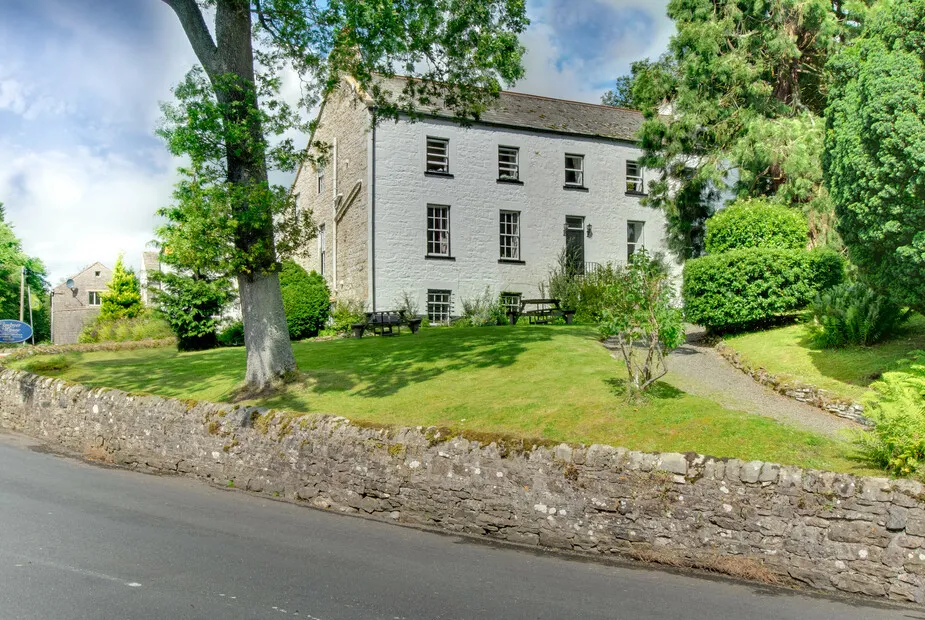
Accommodation
The manor features 11 individually styled en-suite bedrooms, each designed for comfort and character. Rooms range from cosy singles to spacious doubles and family suites, making it ideal for solo travellers, couples, families, and groups. Communal spaces include a comfortable lounge with an open fire, a dining room, and a bar area—perfect for unwinding after a day outdoors. The property is dog-friendly (with prior arrangement) and can be booked exclusively for large groups or special occasions.
Dining
Guests enjoy hearty breakfasts each morning, featuring quality local produce and generous portions. The kitchen can also provide catering for group dinners or special events upon request. The dining experience is complemented by the manor’s friendly hospitality and scenic views of the surrounding fells.
Location & Surroundings
Lowbyer Manor is situated just outside the historic market town of Alston, with its cobbled streets, independent shops, and welcoming pubs. The North Pennines AONB offers sweeping moorlands, waterfalls, and dark skies for stargazing. The manor is perfectly placed for walking the Pennine Way or Isaac’s Tea Trail, cycling, fishing, golf, and even skiing in winter. Day trips to the Lake District, Hadrian’s Wall, the Scottish Borders, and the Yorkshire and Durham Dales are all within easy reach.
Facilities & Features
- 11 en-suite bedrooms (singles, doubles, family rooms)
- Lounge with open fire
- Dining room and bar area
- Dog-friendly (advance notice required)
- Exclusive use/self-catering available for groups
- Ample on-site parking
- Gardens with views over the fells
- Free WiFi
- Suitable for workshops, events, and family gatherings
- Friendly, knowledgeable hosts
Guest Experience
Guests consistently praise Lowbyer Manor for its welcoming atmosphere, comfortable rooms, and excellent hospitality. The hosts are known for their helpfulness and local knowledge, making every stay memorable. The peaceful setting, combined with easy access to Alston’s attractions and outdoor activities, makes the manor a standout choice for visitors to the area.
Practical Information
- Location: On the fringe of Alston, Cumbria
- Bedrooms: 11 en-suite rooms
- Accommodation Type: Bed and breakfast; exclusive self-catering available
- Pet Policy: Dog-friendly (advance notice required)
- Facilities: Lounge with open fire, dining room, bar, gardens
- Parking: Ample on-site parking
- Nearby Attractions: Pennine Way, Isaac’s Tea Trail, Lake District, Hadrian’s Wall, North Pennines AONB
- Activities: Walking, cycling, fishing, golfing, skiing, stargazing
Lowbyer Manor Country House is the perfect blend of historic charm, elegant accommodation, and hearty hospitality, an excellent choice for anyone visiting Alston and the North Pennines.
Eastview Bed & Breakfast, Garrigill
Eastview Bed & Breakfast is a delightful, 300-year-old stone cottage set on the edge of the village green in Garrigill, just a few miles from Alston. Renowned as a fell-walker’s oasis, it offers a peaceful and welcoming retreat for hikers, cyclists, and anyone seeking the tranquillity of the North Pennines Area of Outstanding Natural Beauty.
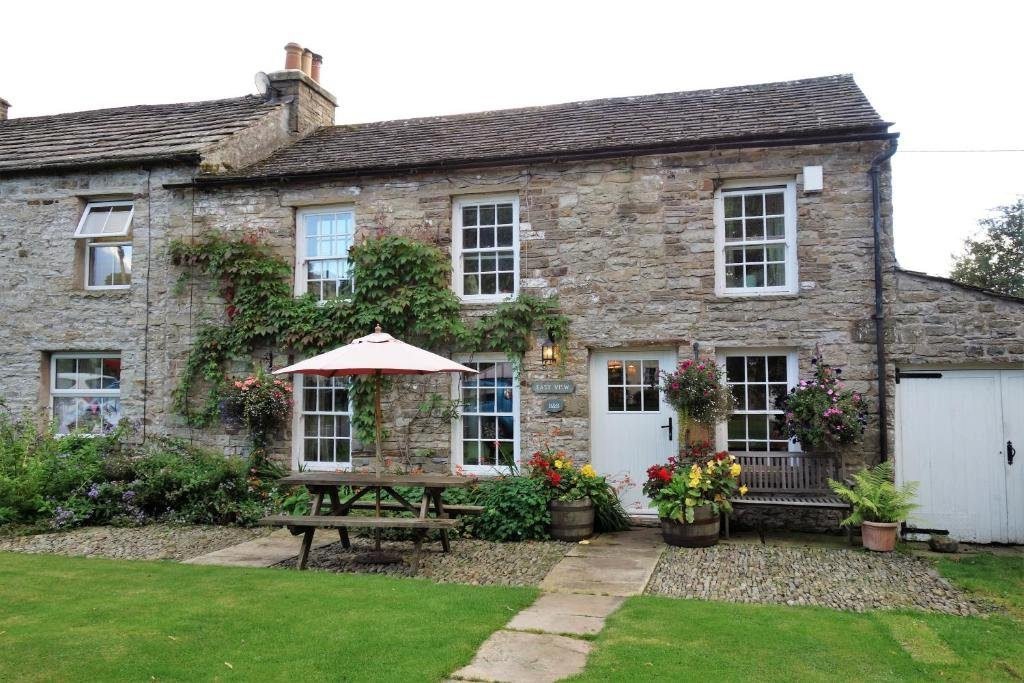
Accommodation
Eastview B&B features two comfortable bedrooms, including one en-suite double. Each room is spacious, elegantly furnished, and equipped with modern amenities such as FreeSat TV, tea and coffee making facilities, central heating, and a mini fridge. Guests can relax in the cosy guest lounge, which offers books, DVDs, games, and a wood-burning stove, perfect for unwinding after a day on the fells. The property is dog-friendly, welcoming pets at no extra charge.
Guest Experience
Guests consistently praise the warm hospitality and local knowledge of the hosts, who go out of their way to ensure a comfortable and memorable stay. The B&B is noted for its peaceful setting, attention to detail, and delicious, hearty breakfasts made with locally sourced ingredients. Secure cycle storage and a guest lounge make it especially popular with walkers and cyclists tackling the Pennine Way or Coast-to-Coast routes.
Facilities & Amenities
- Two bedrooms (including one en-suite double)
- Guest lounge with wood burner, books, DVDs, and games
- Free breakfast included
- Free on-site parking
- Dog-friendly (no extra charge)
- Secure cycle storage
- Free WiFi
- Evening meals are available by pre-order
- Non-smoking property
Location & Surroundings
Located on the edge of Garrigill’s village green, Eastview B&B is perfectly positioned for exploring the Pennine Way, Coast-to-Coast cycle route, and other scenic trails. The peaceful village setting offers a true escape, while Alston’s shops, pubs, and attractions are just three miles away. The B&B is an excellent base for walking, cycling, and discovering the wild beauty of the North Pennines.
Practical Information
- Location: Edge of village green, Garrigill, Cumbria
- Bedrooms: 2 (including 1 en-suite double)
- Breakfast: Included, locally sourced, highly rated
- Pet Policy: Dog-friendly, no extra charge
- Cycle Storage: Secure storage available
- Parking: Free on-site
- WiFi: Available
- Evening Meals: Available by pre-order
Eastview Bed & Breakfast is a top choice for fell-walkers, cyclists, and anyone seeking a cosy, friendly, and peaceful stay in the heart of the North Pennines. With its comfortable rooms, excellent breakfasts, and welcoming hosts, it’s a true oasis for outdoor adventurers and rural explorers alike.
West Nattrass Guest House, Alston
West Nattrass Guest House offers a peaceful rural retreat just outside Alston, Cumbria, in the heart of the North Pennines Area of Outstanding Natural Beauty. Set in a historic building surrounded by open countryside, this guest house is ideal for walkers, cyclists, and anyone seeking a quiet, restful stay with beautiful views of the surrounding hills and mountains.
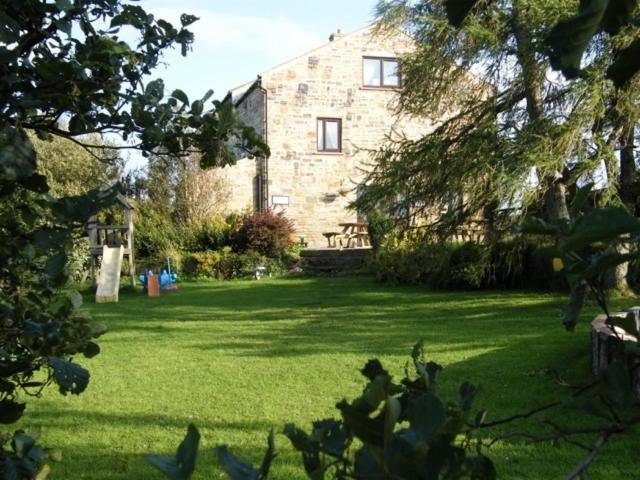
Location
West Nattrass is located about 1.9 km (just over a mile) from Alston town centre, along Middleton Road. Its rural setting provides a serene environment away from the bustle of town, yet it remains convenient for exploring Alston’s shops, pubs, and attractions, as well as local walking and cycling trails.
Accommodation & Facilities
- Comfortable, well-appointed rooms with modern amenities
- Flat-screen TVs with cable channels
- Tea and coffee-making facilities in all rooms
- Private entrance for guest privacy and convenience
- Free WiFi throughout the property
- Free private parking on site
- Sun terrace with mountain views, perfect for relaxing outdoors
- Clean, cosy rooms and a peaceful atmosphere
Guest Experience
Guests frequently praise the comfortable beds, hearty and delicious breakfasts, and the warm hospitality of hosts Stephen and Gina. The quiet rural setting, combined with easy access to Alston’s amenities and the area’s outdoor activities, makes West Nattrass a popular choice for those seeking a restful countryside stay. The guest house is especially suited for walkers, cyclists, and nature lovers exploring the Pennine Way, Coast-to-Coast route, and scenic local trails.
Practical Information
- Location: Gill Middleton Road, Alston, Cumbria, CA9 3DA
- Distance from Alston: Approx. 1.9 km (1.2 miles) from the town centre
- Rooms: Comfortable, well-equipped with modern amenities
- Facilities: Free WiFi, private entrance, sun terrace, free parking
- Atmosphere: Peaceful, rural, scenic mountain views
- Hosts: Friendly and attentive
- Ideal for: Walkers, cyclists, nature lovers, and peaceful stays
West Nattrass Guest House is an excellent choice for visitors looking to unwind and explore the natural beauty of the North Pennines and Alston area. Whether you are hiking, cycling, or simply seeking a quiet retreat, you’ll find a warm welcome and a restful base for your adventures.
Many B&Bs offer secure bike storage, drying rooms, and packed lunches for outdoor adventurers, as well as family and pet-friendly rooms.
Historic Inns and Hotels
For those who prefer a traditional inn experience, Alston boasts several historic pubs and small hotels. The Cumberland Inn is renowned for its friendly welcome, award-winning real ales, and spectacular views over the South Tyne Valley, with comfortable en-suite rooms and a popular restaurant. Alston House Hotel offers stylish accommodation and a modern British menu.
Victoria Inn, Alston
Victoria Inn is a traditional, family-run town centre inn located on Front Street in the heart of Alston, Cumbria. Known for its welcoming atmosphere, affordable accommodation, and convenient location, it is an excellent base for exploring the North Pennines and the Pennine Way.

Key Features
- Location: Front Street, Alston, CA9 3SE, United Kingdom. Just 200 yards from the town centre and close to the South Tynedale Railway.
- Accommodation: Offers 8 rooms, including single, double, triple, and family options. Rooms are clean, comfortable, with some offering countryside views. Facilities include tea/coffee making, free WiFi, and en-suite or shared bathrooms.
- Breakfast: Highly rated with options including continental, full English/Irish, vegetarian, and gluten-free breakfasts.
- Bar & Social Spaces: Traditional bar serving a range of draft beers, lagers, and ciders. Features a games area with a pool table and a dart board, plus a lounge for relaxation.
- Dining: Incorporates an Indian restaurant (Kazana) on site and is close to other local dining options.
- Activities: Ideal for walkers and cyclists with secure bike storage and proximity to the Pennine Way and Coast-to-Coast cycle route. Nearby activities include hiking, cycling, billiards, darts, bowling, fishing, golf, and horse riding.
- Pet Policy: Pet-friendly rooms available (check availability).
- Parking: Accessible parking is provided for guests.
- WiFi: Free throughout the inn.
Guest Experience
Guests praise the Victoria Inn for its friendly and accommodating staff, traditional charm, and excellent value for money. The breakfast is described as filling and satisfying, and the inn’s central location makes it a popular choice for visitors exploring Alston and the surrounding countryside.
Practical Information
- Address: Front Street, Alston, CA9 3SE, UK
- Rooms: Single, double, triple, family
- Breakfast: Continental, Full English/Irish, Vegetarian, Gluten-free
- Bar: Yes, with a games area (pool, darts)
- Restaurant: Indian restaurant on site; other options nearby
- Pet-friendly: Yes (check room availability)
- Parking: Accessible parking is available
- WiFi: Free throughout
- Phone: Check booking platforms for the latest contact details
The Victoria Inn is a great choice for visitors seeking a traditional, friendly, and affordable stay in the centre of Alston, with easy access to walking and cycling routes, local attractions, and community events.
The Angel Inn, Alston
The Angel Inn is a historic and welcoming pub located on Front Street in the heart of Alston, Cumbria. Dating back to 1611, this traditional inn is renowned for its classic pub fare, relaxed atmosphere, and deep roots in the local community. Its charming 17th-century stone building and friendly staff make it a favourite with both locals and visitors exploring the North Pennines.
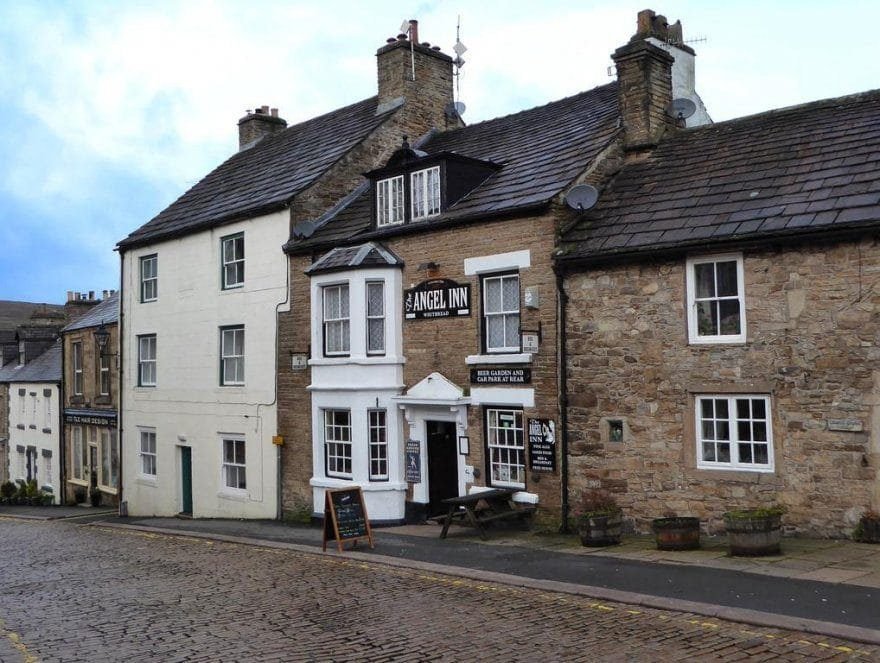
Atmosphere and Setting
The Angel Inn offers a cosy, traditional English pub experience with original features and a warm, community-focused vibe. Guests can enjoy meals and drinks in the inviting bar area or relax in the quiet garden during warmer months. The inn’s colourful history includes time as the town hall and even a makeshift prison, adding to its unique character. Regulars appreciate the lively Sunday lunches and the pub’s role as a social hub, complete with a darts team and local events.
Classic Pub Fare
The menu at The Angel Inn features hearty, home-cooked dishes typical of a traditional English pub. Enjoy favourites such as steak and ale pie, Cumberland sausage, fish and chips, and seasonal specials. The pub is also known for its popular Sunday roasts. Real ales from local breweries are served alongside a range of other drinks, ensuring there’s something for everyone. The focus is on quality, locally sourced ingredients and generous portions.
Accommodation
The Angel Inn offers comfortable rooms with private bathrooms, TV, and complimentary tea and coffee facilities. Accommodation is ideal for walkers, cyclists, and families looking to explore Alston and nearby attractions such as the South Tynedale Railway and the Pennine Way. Guests appreciate the clean, traditional rooms and the inn’s convenient central location.
Practical Information
- Location: Front Street, Alston, Cumbria, CA9 3SE
- Established: Circa 1611
- Accommodation: Rooms with private bathrooms, TV, tea/coffee
- Dining: Classic pub fare, Sunday lunches, real ales
- Atmosphere: Relaxed, traditional, community-oriented
- Nearby Attractions: South Tynedale Railway, Pennine Way, local mines
- Accessibility: Central Alston, walking distance to key sites
The Angel Inn is a must-visit for anyone seeking authentic pub food, a relaxed setting, and a taste of Alston’s rich history. With its combination of traditional hospitality, local character, and hearty meals, it’s a true gem in the heart of the North Pennines.
Lovelady Shield Country House Hotel, Alston
Lovelady Shield Country House Hotel is a charming Georgian country house set in tranquil gardens just outside Alston, Cumbria. Nestled along the River Nent in the North Pennines Area of Outstanding Natural Beauty, the hotel offers a peaceful retreat with a blend of historic character and modern comfort, perfect for those seeking relaxation, outdoor adventure, or a taste of rural Cumbrian hospitality.
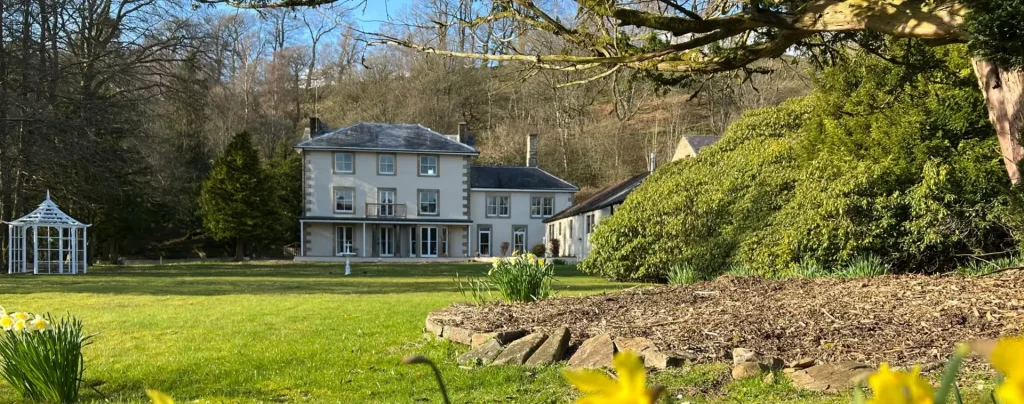
Location
Located about 2.5 miles east of Alston town centre, Lovelady Shield sits within 3.5 acres of beautifully maintained gardens and grounds. Its riverside setting provides a serene backdrop, while the North Pennines, Hadrian’s Wall, and the Lake District are all within easy reach for day trips and exploration.
Accommodation
The hotel features a historic 16th-century Georgian main house with 14 en-suite rooms, including double, single, twin, and triple options. For those seeking more privacy or self-catering, there are five cosy, dog-friendly cottages with two to four bedrooms each. Many rooms and cottages offer views of the gardens or the River Nent, and all are designed for comfort with crisp linens, fluffy pillows, and well-appointed bathrooms. Dog-friendly accommodation is available; advanced booking is recommended for these rooms and cottages.
Facilities & Amenities
- Free WiFi throughout the property
- Free on-site parking
- Bar and coffee lounge serving light bites, sandwiches, homemade soups, and pastries
- Breakfast service (full English and continental options by reservation)
- Traditional Sunday roast served noon–4 pm
- Shared lounge and TV area for relaxation
- Outdoor furniture and garden seating areas
- Laundry service available
- Non-smoking rooms and hotel environment
- Dog-friendly rooms and cottages
Dining
Guests can enjoy a variety of breakfast options, including full English and continental choices. The coffee lounge offers a relaxed setting for light meals and snacks throughout the day, and the traditional Sunday roast is a highlight for many visitors. The kitchen emphasises fresh, locally sourced ingredients and homemade dishes, ensuring a memorable dining experience in a tranquil setting.
Activities & Nearby Attractions
- Walking, hiking, cycling, and birdwatching in the North Pennines AONB
- Easy access to the Pennine Way and South Tyne Trail
- Close to Killhope Lead Mining Museum and Featherstone Castle
- Day trips to Hadrian’s Wall, the Lake District, and Durham Cathedral (all within about an hour’s drive)
- Ideal for exploring local history, nature, and rural Cumbrian culture
Guest Experience
Guests praise Lovelady Shield for its peaceful setting, friendly and helpful staff, and comfortable accommodations. The gardens and riverside location offer a relaxing atmosphere, while the hotel’s pet-friendly approach makes it a popular choice for dog owners. The combination of historic charm and modern amenities ensures a memorable stay for couples, families, and solo travellers alike.
Practical Information
- Address: Lovelady Lane, Alston, Cumbria, CA9 3LX, UK
- Distance from Alston: About 2.5 miles east of the town centre
- Rooms: 14 en-suite rooms in the main house
- Cottages: 5 dog-friendly self-catering cottages
- Check-in: From 3:00 PM
- Check-out: By 11:00 AM
- Parking: Free on-site parking
- WiFi: Free throughout the property
- Pet Policy: Dog-friendly rooms and cottages (advance booking recommended)
- Dining: Breakfast (reservation recommended), coffee lounge, Sunday roast
- Nearby Attractions: North Pennines AONB, Killhope Lead Mining Museum, Featherstone Castle, Hadrian’s Wall, Lake District
Lovelady Shield Country House Hotel is the perfect choice for those seeking a serene countryside escape with a blend of historic elegance and modern comfort. Its tranquil gardens, comfortable accommodations, and proximity to Alston and the North Pennines make it a standout destination for relaxation, outdoor adventure, and a true taste of rural Cumbria.
Self-Catering Cottages and Apartments
If you prefer the flexibility of your own space, Alston has a wealth of self-catering options. Choose from cosy stone cottages, converted barns, and stylish apartments—many with open fires, gardens, and stunning views of the fells. Alston Art Apartments and Millstream Apartment are highly rated for their comfort and location, while Ghyll Burn Cottage and Barn End offer rural seclusion just outside town. There are also family-friendly and dog-friendly cottages, as well as larger properties for groups or longer stays. Booking platforms and local tourism websites list dozens of options, from budget-friendly to four-star gold-rated retreats.
Hostels and Budget Accommodation
For walkers, cyclists, and those on a budget, Alston Youth Hostel and other group accommodations provide affordable, sociable stays with self-catering kitchens, drying rooms, and secure bike storage. These are especially popular with Pennine Way hikers and Coast-to-Coast cyclists.
Booking Tips
Alston is a popular base for festivals, walking holidays, and cycling events, so it’s wise to book your accommodation well in advance, especially during peak seasons (spring, summer, and autumn weekends) and local events. Many places offer online booking, and some provide discounts for longer stays or midweek breaks. If you have specific needs (such as dog-friendly rooms, accessible facilities, or group bookings), contact your chosen accommodation directly to ensure the best experience.
Wherever you choose to stay, you’ll find a warm Cumbrian welcome and easy access to Alston’s attractions, trails, and local food scene. For the latest availability and recommendations, check local tourism websites or contact the Alston Tourist Information Centre for personal advice.
Dining in Alston
Alston’s pubs, cafes, and restaurants offer a warm welcome and a true taste of Cumbria’s culinary heritage. You’ll find everything from hearty pub classics to homemade cakes, with most establishments independently owned and proud to use local ingredients whenever possible. Look out for dishes featuring Cumbrian lamb, Cumberland sausage, and local cheeses, as well as seasonal vegetables and fruit from the region’s farms and community growers. Popular spots include the:
Cumberland Inn, Alston
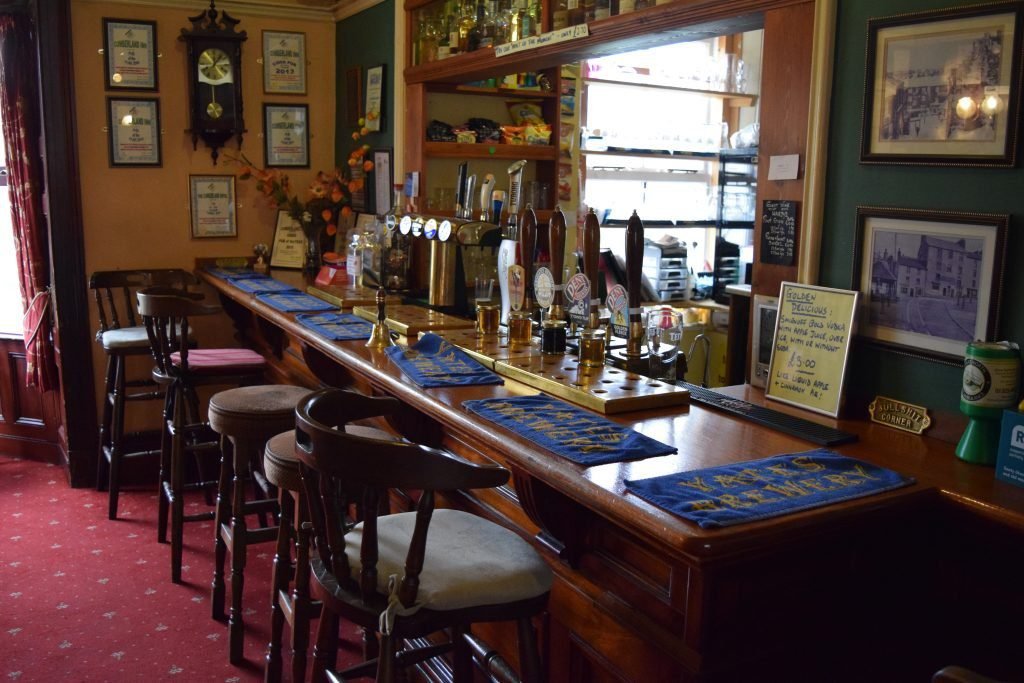
The Cumberland Inn is a welcoming 19th-century inn located in the heart of Alston, just 100 yards from the town centre. It’s renowned for its friendly atmosphere, traditional hospitality, and spectacular views over the South Tyne Valley. The inn is a favourite with both locals and visitors, offering comfortable en-suite rooms (including family and dog-friendly options), free WiFi, and secure bike storage, making it ideal for walkers and cyclists exploring the North Pennines, Pennine Way, or Coast-to-Coast route.
The Cumberland Inn’s award-winning bar has been recognised multiple times by CAMRA for its excellent selection of real ales and ciders, often featuring local breweries such as Hesket Newmarket, Allendale, and Consett Ale Works. The bar is open daily and offers a cosy spot with log fires in winter and a terrace for outdoor dining with valley views in summer.
The restaurant serves a varied menu of home-cooked classics and Cumbrian specialities, including steak and ale pie, Cumberland sausage, locally sourced steaks, vegetarian and vegan options, and indulgent desserts like sticky toffee pudding. There’s also a selection of curries, burgers, and lighter bites, with gluten-free and children’s menus available. Breakfast is highly rated, with full English, continental, vegetarian, and vegan options.
Advance booking is recommended for both accommodation and dining, especially during weekends and holidays. The inn also caters for private parties and functions, and welcomes families and well-behaved dogs. There’s parking on site and public parking nearby.
- Address: The Cumberland Inn, Townfoot, Alston, Cumbria, CA9 3HX
- Phone: 01434 381875
- Email: stay@cumberlandalston.com
- Website: www.cumberlandalston.co.uk
- Opening Hours: Daily, 12:00 – 23:00
- Facilities: Bar, restaurant, en-suite rooms, dog-friendly, family rooms, bike storage, beer garden, parking, free WiFi
Whether you’re after a hearty meal, a pint of local ale, or a comfortable base for exploring Alston and the North Pennines, the Cumberland Inn is a top choice for visitors seeking authentic Cumbrian hospitality.
Alston House Hotel & Restaurant
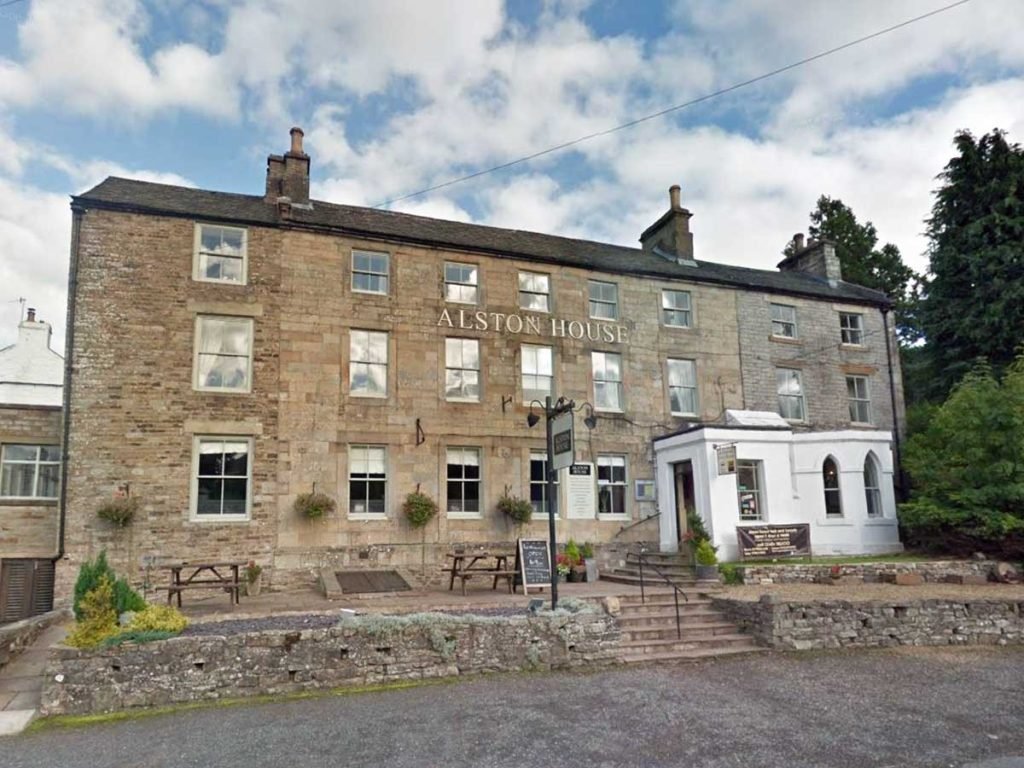
Alston House is a stylish, independently owned hotel and restaurant located at the entrance to Alston’s historic town centre. Known for its welcoming atmosphere, attentive service, and modern British menu, Alston House is a favourite with both visitors and locals. The restaurant offers a varied menu featuring locally sourced steaks, fresh seafood, vegetarian and vegan dishes, and creative daily specials. There’s also a popular breakfast menu with options ranging from full Cumbrian breakfasts to lighter choices like fruit, granola, and yoghurt.
The dining room is bright and contemporary, with views of the surrounding fells, and there’s a sunny terrace for outdoor eating in warmer months. The bar serves a selection of local ales, wines, and spirits, and is a great spot to relax after a day exploring the North Pennines. Alston House is praised for its friendly staff, generous portions, and excellent value. The kitchen is happy to accommodate dietary requirements, including gluten-free, vegetarian, and vegan options—just let them know when booking or ordering.
- Address: Alston House Hotel, Townfoot, Alston, Cumbria, CA9 3RN
- Phone: 01434 382200
- Email: enquiries@alstonhouse.co.uk
- Website: www.alstonhousehotel.co.uk
- Opening Hours: Breakfast, lunch, and dinner served daily (check website for seasonal times and booking info)
- Facilities: Restaurant, bar, terrace, en-suite rooms, private parking, free WiFi, dog-friendly rooms available
Advance booking is recommended, especially for dinner or during weekends and holidays. Whether you’re seeking a hearty breakfast, a relaxed lunch, or a memorable evening meal, Alston House offers quality dining in the heart of the North Pennines.
Saddlers Bakery and Bistro
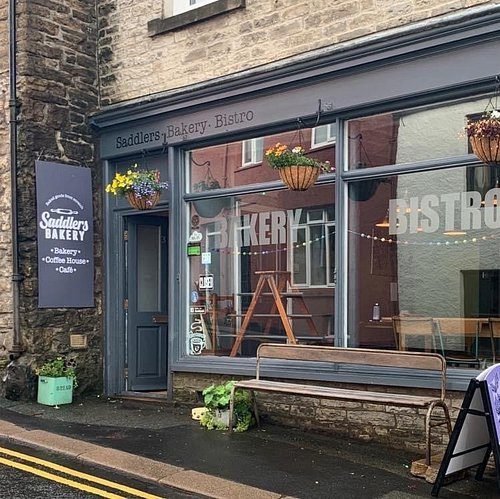
Saddlers is a much-loved artisan bakery and café located in the heart of Alston, just a short stroll from the Market Cross. Owners Hayley and Rick Jones have created a warm, welcoming space where everything is made from scratch on-site, including fresh breads, hand-raised pies, pastries, cakes, and savoury bakes. Where possible, they use organic, seasonal, and locally sourced ingredients, reflecting their commitment to quality and the local community.
The bistro is renowned for its generous portions and home-cooked flavour. Signature dishes include the steak and ale pie with hand-cut chips and homemade gravy, as well as a variety of vegetarian-friendly options and daily specials. Their Bakewell tart, frangipane, and a rotating selection of cakes and scones are local favourites. Weekend visitors can enjoy an expanded bistro menu, and there are always tempting breads and pastries to take away.
Saddlers is a popular stop for walkers and cyclists on Isaac’s Tea Trail, and the friendly staff are known for their hospitality. Dogs are welcome, and there’s usually a roaring fire in colder months. The café is family-friendly, offers free WiFi, and caters for a range of dietary needs, including vegetarian and vegan options. They also accept card and digital payments and offer takeout for those on the go.
- Address: 3 West View, Front Street, Alston, CA9 3SF
- Phone: 07494 129845
- Website: saddlersbakery.co.uk / Facebook
- Opening Hours: Tuesday–Saturday, 10:00–15:00 (closed Sunday & Monday)
- Features: Takeout, reservations, outdoor seating, dog-friendly, vegetarian and vegan options, free WiFi, family style, accepts credit cards
Looking for a hearty breakfast, a light lunch, or a sweet treat to fuel your adventures, Saddlers Bakery and Bistro is a true gem of Alston’s food scene and a favourite with both locals and visitors.
The Nook Farm Shop & Cafe
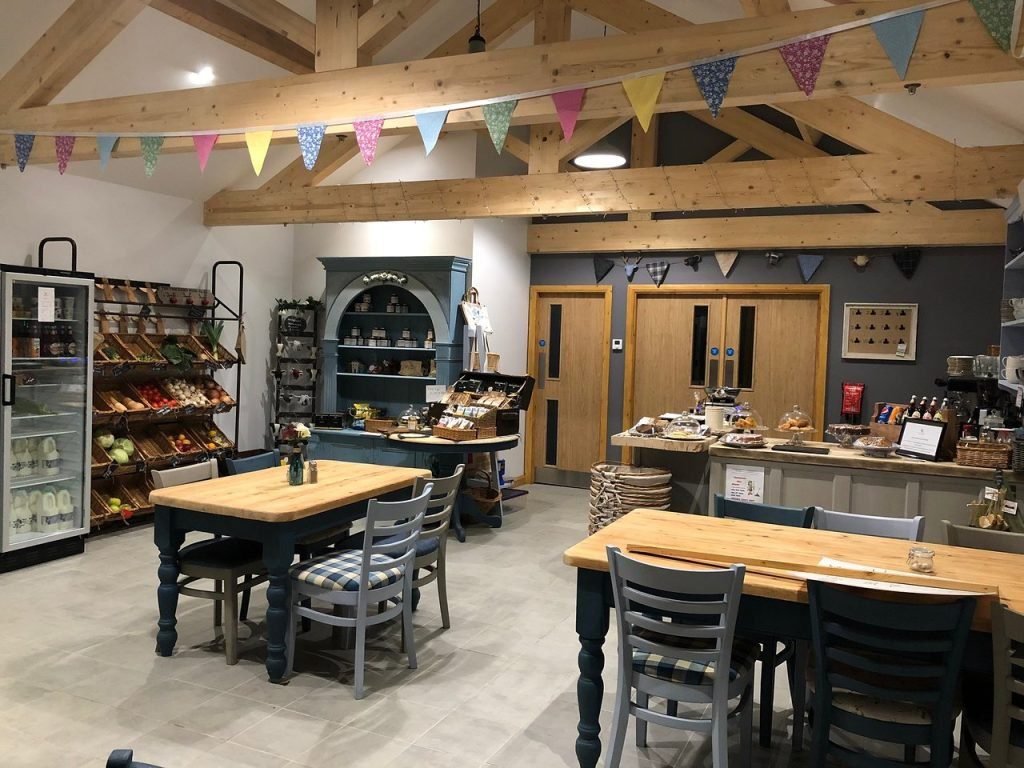
Situated just two miles north of Alston, right beside the Epiacum Roman Fort, The Nook Farm Shop & Cafe is a welcoming stop for visitors exploring the North Pennines and the Roman heritage of the area. Opened in 2019, The Nook is dedicated to serving the community and promoting local producers, with a menu and shop full of homemade and locally sourced treats. The café is open every day, typically from 9 am to 4:30 pm, and offers full disabled access along with a large, flat car park for easy access.
The menu features hearty all-day breakfasts, bacon rolls, homemade scones, cakes, and a variety of bakery items. Many ingredients come directly from the farm, including their own beef and lamb, which are also available to purchase in the shop. You’ll also find local honey, preserves, and seasonal produce. Vegetarian, vegan, and other dietary needs can be catered for, just ask the friendly staff.
The Nook is a perfect spot for walkers, cyclists, and families, with direct access to trails around Epiacum Roman Fort, the Pennine Way, and the South Tyne Trail. The cafe doubles as an information centre for the Roman site, offering interpretive leaflets, walking guides, and even a family-friendly “Venatus Trail” activity for children. Outdoor seating is available, and dogs are welcome.
- Address: The Nook, Epiacum Roman Fort, Kirkhaugh, Alston, CA9 3BG
- Phone: 07415 029398
- Website: thenookfarmshop.com
- Opening Hours: Every day, 9:00 am – 4:30 pm (may vary seasonally; check ahead)
- Features: Farm shop, café, homemade and local produce, all-day breakfast, cakes, scones, beef and lamb from their own farm, vegetarian and vegan options, disabled access, large car park, outdoor seating, dog-friendly, information centre for Epiacum Roman Fort, family activities
If you’re looking to refuel after a walk around the Roman fort, shopping for local meats and treats, or simply enjoying a homemade scone with a view of the fells, The Nook Farm Shop & Cafe offers a genuine taste of Alston Moor’s hospitality and heritage.
Don’t miss out on regional specialities such as Grasmere gingerbread, sticky toffee pudding, and Kendal mint cake, all Cumbrian icons. Many venues offer vegetarian, vegan, and gluten-free options, and staff are generally happy to advise on food allergies or special dietary needs. For something sweet, Alston Ices serves award-winning local ice cream near the Market Cross during warmer months.
To support the local community, consider shopping at Alston Wholefoods for artisan cheeses, preserves, and seasonal produce, or visiting the regular markets for homemade jams, honey, and baked goods. Whether you’re enjoying a leisurely meal or grabbing a picnic for a day on the fells, Alston’s food scene is a delicious part of the area’s unique character.
Packing Essentials
The weather in Alston and the North Pennines can be highly changeable, even in summer, so it’s important to pack with versatility and comfort in mind. Bring layered clothing, including a lightweight base layer, warm mid-layers, and a waterproof outer jacket, so you can easily adapt to shifting temperatures, wind, and rain. Sturdy, waterproof footwear is a must for walking on cobbled streets, moorland trails, and sometimes muddy paths.
Don’t forget a camera to capture Alston’s dramatic landscapes, historic architecture, and vibrant local life. Binoculars are recommended for spotting upland birds, red squirrels, and panoramic views across the fells. If you plan to stargaze, pack a torch (preferably with a red light setting to protect your night vision) and extra warm layers for clear, chilly nights.
Other useful items include a reusable water bottle, sun protection (hat, sunglasses, sunscreen), and a small backpack for carrying essentials on day trips. If you’re planning picnics or wild swimming, bring a blanket, a towel, and any necessary permits. For families, pack games or books for cosy evenings, and remember any medications or personal items, as shops in Alston are small and may have limited stock.
Local Guides
Enhance your visit to Alston by booking a tour or walk with a knowledgeable local guide. These guides are often lifelong residents or passionate experts who bring the area’s rich history, geology, and wildlife to life in a way that guidebooks simply can’t match. With their in-depth knowledge, you’ll discover hidden gems such as tucked-away waterfalls, secret viewpoints, or lesser-known historic sites that most visitors miss.
Local guides can tailor experiences to your interests, whether you want to delve into Alston’s mining heritage, explore the dramatic landscapes of the North Pennines, or learn about rare upland wildlife and wildflowers. Some guides offer themed walks, such as stargazing tours beneath Alston’s famously dark skies, or visits to ancient sites like Epiacum Roman Fort. Others can introduce you to local craftspeople, artists, and traditional food producers, giving you a deeper connection to the community and its culture.
By choosing a local guide, you not only enrich your own experience but also support the area’s economy and help preserve Alston’s unique character for future generations. Guided tours are available for individuals, families, and groups, and can often be arranged through local visitor centres or tourism websites. Whether you’re a history buff, nature lover, or simply curious, a local guide can make your time in Alston truly unforgettable.
How to arrange a local guide or tour in Alston:
- Visit or Contact Alston Local Links Tourist Information Centre:
- Location: Town Hall, Alston, Cumbria, CA9 3RF
- Phone: 01434 382244
- Email: Alston.LocalLinks@westmorlandandfurness.gov.uk
- Opening Times: Monday to Saturday, 10 am–1 pm and 1:30 pm–5 pm (closed Sundays)
- What they offer:
- Information about local history, wildlife, and hidden gems
- Recommendations for guided walks and local tours
- Booking assistance for activities and experiences in Alston and the North Pennines
- Tip:
If you have a specific interest (history, wildlife, geology, stargazing, etc.), mention this when you contact the Tourist Information Centre so they can match you with the most suitable local expert.
Respect the Environment
Alston’s wild beauty and unique character depend on the care and respect of everyone who visits. When exploring the countryside, follow Leave No Trace principles: stick to marked paths to protect fragile habitats, take all litter home, and avoid disturbing wildlife or livestock. If you’re picnicking or wild swimming, leave natural areas exactly as you found them. Be mindful of noise levels and keep dogs under control, especially around farm animals and nesting birds.
Supporting local businesses also plays a vital role in preserving Alston’s charm. Choose to shop at independent stores, dine in local cafes and pubs, and buy handmade crafts or local produce at markets. This not only enriches your visit but also helps sustain the community and its traditions for future generations. By travelling thoughtfully and responsibly, you help ensure that Alston remains a welcoming and unspoiled destination for years to come.
Conclusion: Why Alston Stands Out
Alston is a rare gem in the heart of the North Pennines, blending centuries of history, vibrant community spirit, and breathtaking natural beauty. Its status as England’s highest market town is more than a geographical curiosity; it shapes a unique upland character, where cobbled streets, heritage railways, and ancient trails invite exploration at every turn. Whether you’re drawn by the promise of outdoor adventure, the allure of local food and culture, or the tranquillity of stargazing under some of the darkest skies in England, Alston offers an experience that is both authentic and unforgettable.
What truly sets Alston apart is its sense of place: a welcoming community, a deep respect for heritage, and a commitment to preserving its wild landscapes for future generations. Here, visitors find not just a destination, but a way of life rooted in tradition, shaped by nature, and open to all who seek discovery and connection. Whether you come for a day or linger for a season, Alston promises memories that will last long after you leave its windswept fells and friendly market square behind.

FAQs - Exploring Alston
Where is Alston located?
Alston is a small market town in Cumbria, England. It sits high in the North Pennines, an Area of Outstanding Natural Beauty (AONB), and is known for being one of the highest market towns in England.
What is Alston known for?
Alston is known for its cobbled streets, historic buildings, and its scenic location in the North Pennines. It is also famous for the South Tynedale Railway, a narrow-gauge heritage railway that runs through the picturesque countryside.
What are some notable landmarks in Alston?
Notable landmarks include the South Tynedale Railway, Alston Moor Historical Society Museum, and the 17th-century St. Augustine’s Church. The town’s traditional architecture adds to its historical charm.
What outdoor activities can I do in and around Alston?
Alston is ideal for outdoor activities such as hiking, cycling, and birdwatching. It serves as a great base for exploring the North Pennines, with popular walking trails like the Pennine Way and the Isaac's Tea Trail nearby.
What annual events take place in Alston?
Alston hosts several annual events, including local fairs, craft markets, and heritage railway events. The town also celebrates seasonal festivities and community gatherings that showcase local traditions.
What is the history of Alston?
Alston has a rich history linked to lead mining, which was prominent in the region during the 17th and 18th centuries. The town’s heritage is still evident in its buildings and local museum exhibits.
How do I get to Alston?
Alston is accessible by road, with connections via the A686, which offers a scenic route through the North Pennines. Public transport options include bus services from nearby towns, and Penrith is the nearest train station, around 20 miles away.
